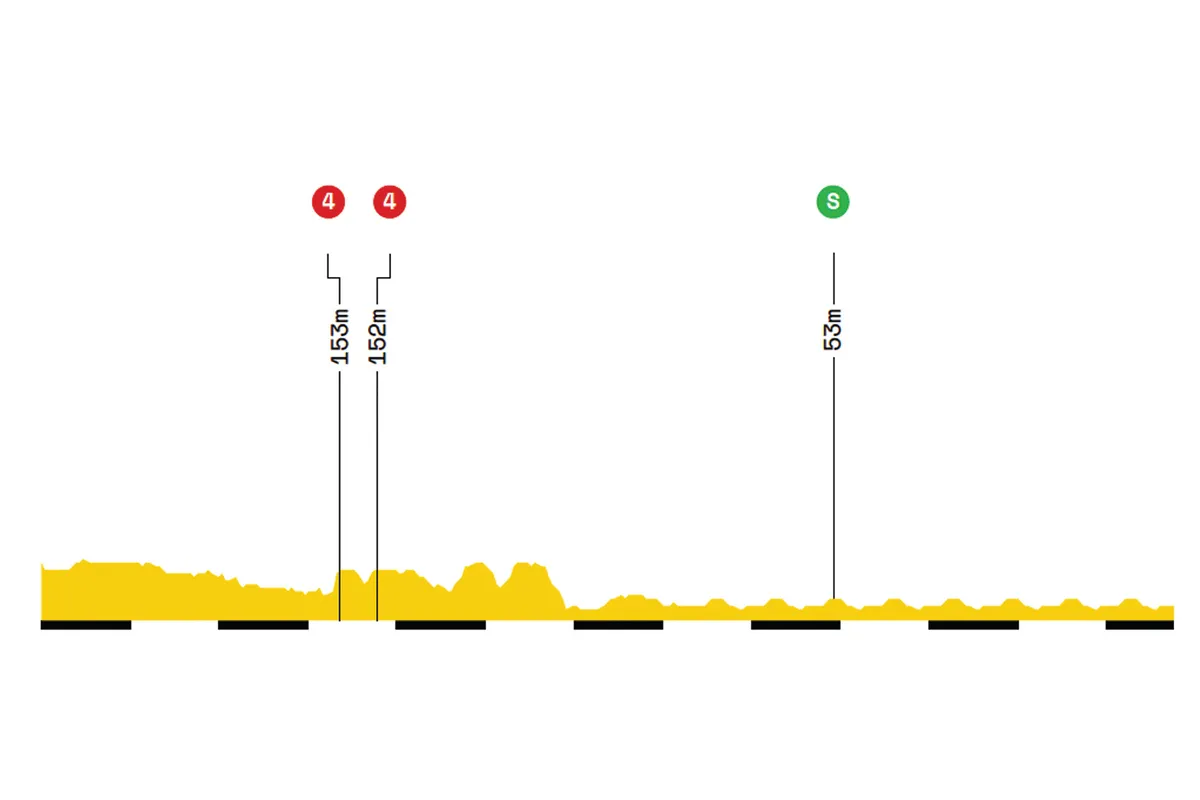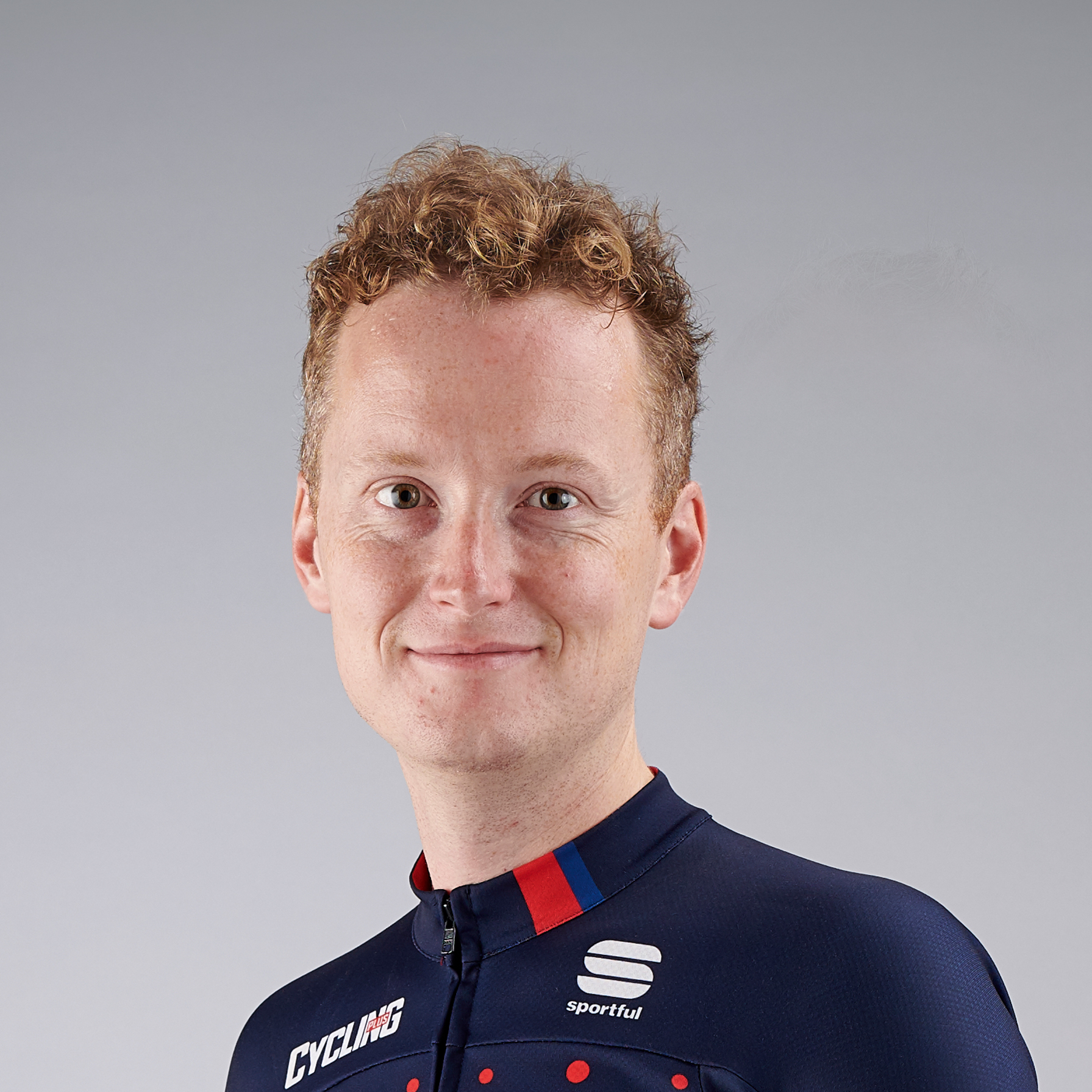The 106th edition of the Tour de France starts in Brussels with the Grande Départ on Saturday 6 July and concludes on the Champs-Élysées in Paris on Sunday 28 July.
Over the course of those weeks, the riders will endure 3,480km of riding spread over 21 stages, including seven mountain stages, with five summit stage finishes, five hilly stages, seven flat stages and an individual and team time trial.
This stage-by-stage breakdown will tell you what to expect and what to look out for each day, plus give you an insight into the history of each stage.
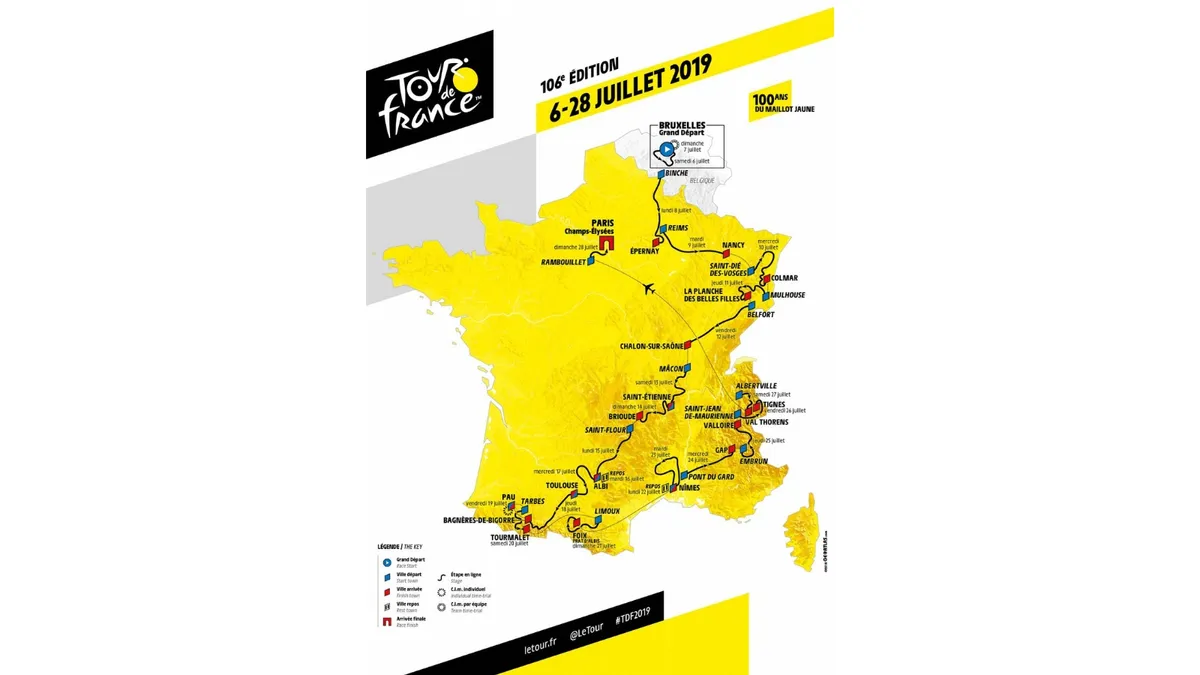
What is the route for the Tour de France 2019?
Stage 1: Bruxelles — Brussels
- Date: 6 July
- Distance: 194.5km — Flat
- Did you know? This will be the fifth time Belgium has hosted the Grand Départ (one behind the record of six, held by the Netherlands)
- The ones to watch: Dylan Groenewegen (Team Jumbo – Visma), a big name absentee from the Giro, to open his account early.
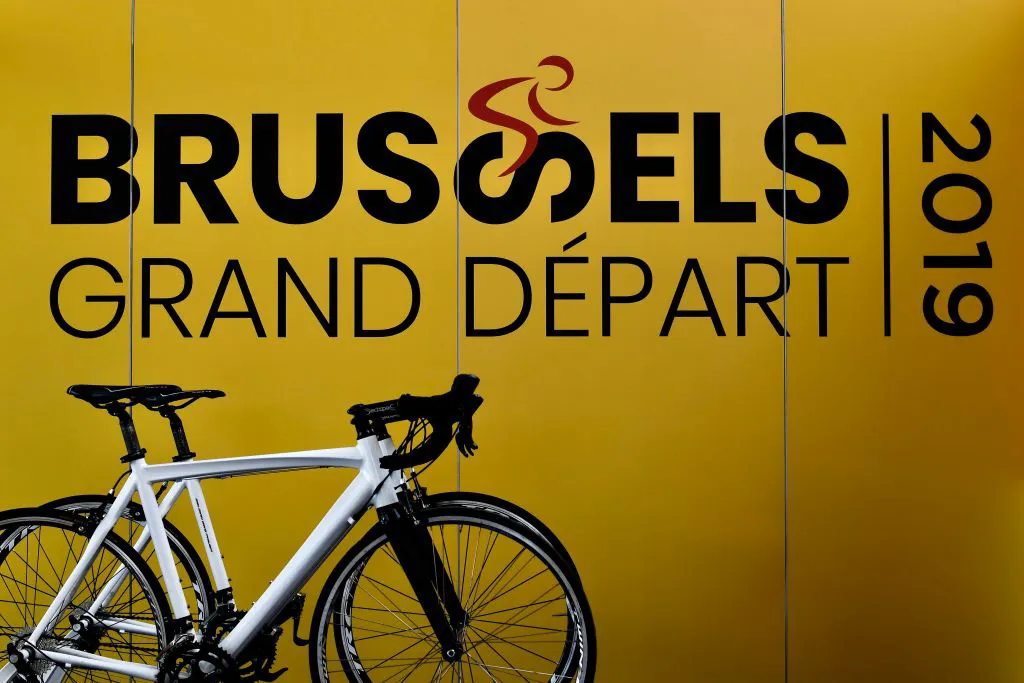
Billed as the highest Tour de France in history, the race begins decidedly low with this loop in Brussels (elevation: 13m). It’s the second time the Belgian capital has hosted the Grand Départ, the first being 1958, which was won by ace sprinter and Frenchman André Darrigade.
You’d be hard-pressed to bet against one of the fast men taking the first yellow jersey. No rider has spent more days in yellow than Eddy Merckx (111), and The Cannibal is the reason why the race is back in Brussels on his local roads. Merckx won a record-equaling five Tours in his career and 2019 marks the 50th anniversary since his first.
A highlight of the opening stage, which dips, symbolically, into all three of Belgium’s regions – Brussels, Wallonia and Flanders – is an ascent of the cobbled Mur de Grammont, better known as the Muur van Geraardsbergen, a legendary climb of the Tour of Flanders.
Along with another Flanders favourite, the Bosberg, it appears too early (43.5km) to play a significant role in today’s proceedings, but it’ll add a bit of stardust.
In further homage to Merckx, the finale goes through the Brussels municipality of Woluwe- Saint-Pierre, where his Faema team won the team time-trial of 1969.
Stage 1 highlights, times and route profile
- 0km: Depart Bruxelles – 11:25
- 43.5km: Cat 3 Mur de Grammont climb – 12:27
- 47.5km: Cat 4 Bosberg climb – 12:32
- 125km: Les Bons Villiers sprint – 14:24
- 194.5km: Arrive in Brussels – 16:02
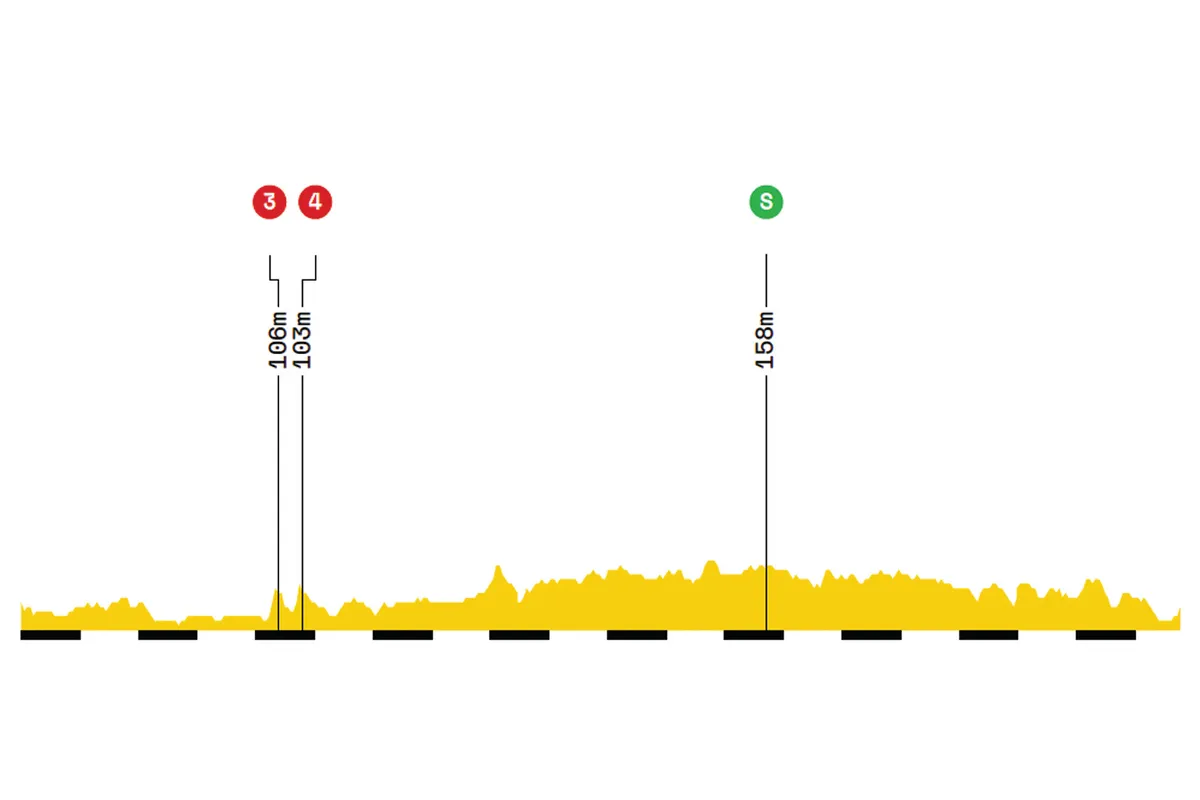
Stage 2: Bruxelles Palais Royal – Brussel Atomium
- Date: 7 July
- Distance: 27.6km — Team time-trial
- Did you know: Orica-GreenEDGE hold the world record for the fastest TTT, winning the 25km stage 4 in 2013 at a speed of 57.841km/h
- The ones to watch: Deceuninck–Quick-Step to repeat its 2018 Innsbruck World Championship win, ahead of Team Ineos
Whoever ends up wearing yellow today it’ll be a good one to win, for the maillot jaune celebrates its centenary in 2019. The jersey was introduced during the 1919 addition by race director Henri Desgrange, to better distinguish the race leader (yellow was the colour that the race’s sponsor, the newspaper L’Auto-Vélo, was printed on).
After a flat and fast opening 4km, the route loops round the Watermael-Boitsfort suburb before bisecting the opening of the course with 10km remaining.
From there the course is short on technical turns, aside from a sharp lefthander in the final kilometre, before the finish at the Atomium, the city’s most-popular tourist site. Built for the Brussels World’s Fair in 1958, it stands 102m tall and represents a single unit of iron crystal magnified 165 billion times.
Team time trials are infrequent and hard to predict. At last year’s race, BMC Racing prevailed, though its demise and reemergence as a lesser-funded outfit, CCC, will mean it won’t begin as favourites.
The usual TTT suspects, Team Ineos and Mitchelton-Scott, will be heavily tipped, particularly as they’ll want to keep their team leaders close to the sharp end of the general classification.
Stage 2 highlights, times and route profile
- 0km: Bruxelles Palais Royal – 13:30 to 15:15
- 13.2km: Split 1 – 13:44 to 15:29
- 20.1km: Split 2 – 13:52 to 15:37
- 27.6km: Arrive in Brussel Atomium – 14:00 to 15:45
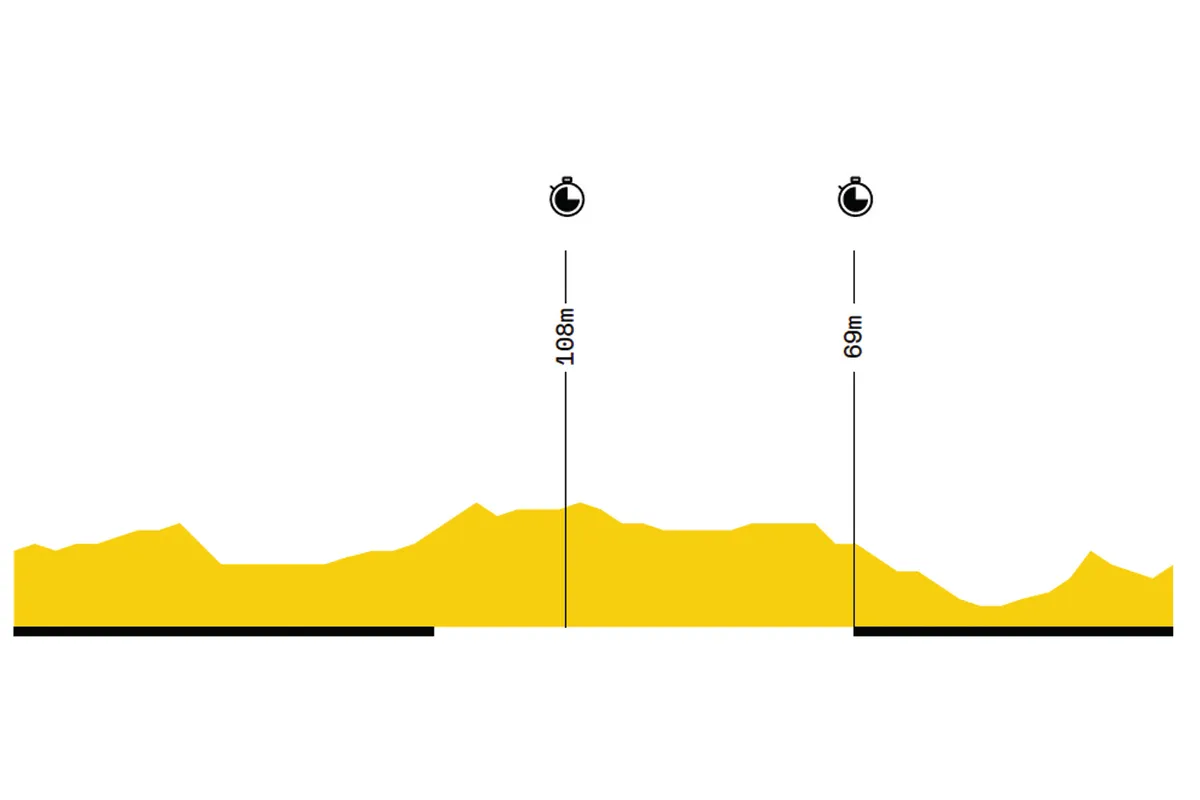
Stage 3: Binche – Épernay
- Date: 8 July
- Distance: 215km — Hilly
- Did you know? In 2018 Champagne exports totalled €2.9bn. Great Britain was the largest importer, with 26.7m bottles
- The ones to watch: Caleb Ewan (Lotto Soudal), fresh from Giro success, likes a rising finish and this will suit him down to the ground
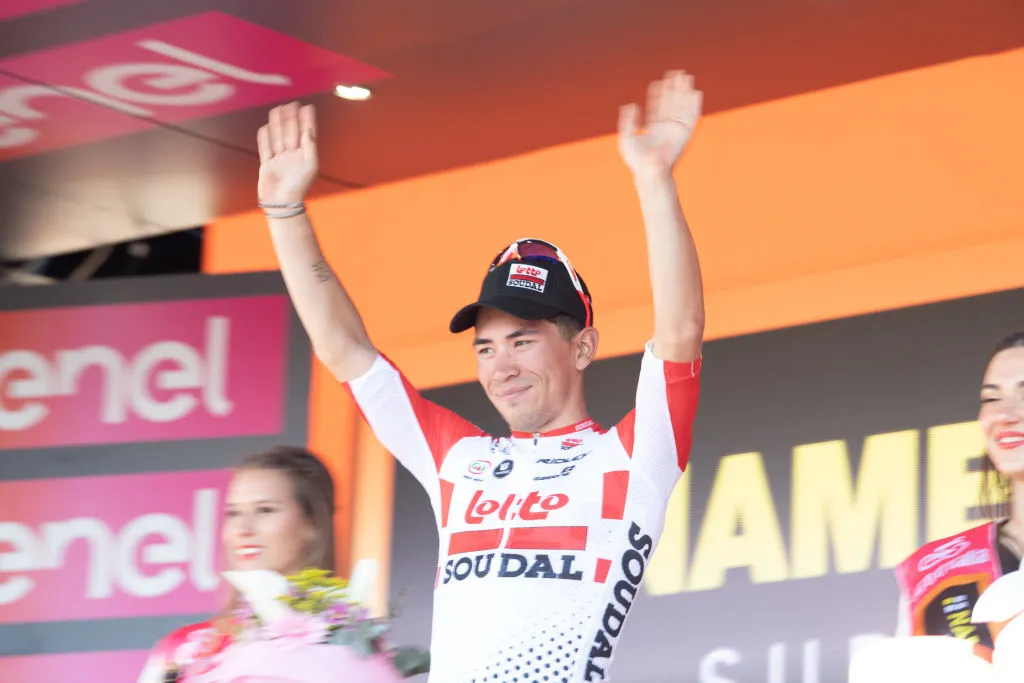
Once again we begin in Belgium, this time Binche, though not for long, because 10km in, France gets its national race back.
Binche has been a recent start (though not this year) of La Flèche Wallonne, the one-day classic of the hilly Ardennes, sandwiched midweek between the Amstel Gold race and Liège-Bastogne-Liège.
But it’s the end of today’s stage, once we’re well into northern France and east of Paris, that’ll cause the most problems.
Skirting around the western edge of the Ardennes, the route sends the peloton south to Épernay, a prosperous town built on its link to the Champagne trade and the self-proclaimed capital of the world’s most famous fizz.
Its Avenue de Champagne, filled with champagne houses and cellars, is a UNESCO World Heritage Site that stretches for almost a kilometre.
The winner of today will no doubt be furnished with a magnum and they’ll deserve a glass at dinner, with a tough finish perfect for the faster riders with a penchant for climbs.
There are four in the final 30km, bisecting the Montagne de Reims natural park, which is home to much of the region’s Champagne production. Into Épernay, and there’s a further ramp into the finish line to complicate matters for the sprinters.
Stage 3 highlights, times and route profile
- 0km: Depart Binche – 11:20
- 102km: Dizy-le-Gros spring – 13:49
- 173km: Cat 4 Côte de Nanteuil-la-Forêt climb – 15:32
- 185.5km: Cat 3 Côte d'Hautvillers climb – 15:51
- 190km: Cat 3 Côte de Champillon climb – 15:58
- 199km: Cat 3 Côte de Mutigny climb – 16:11
- 215km: End in Épernay – 16:34
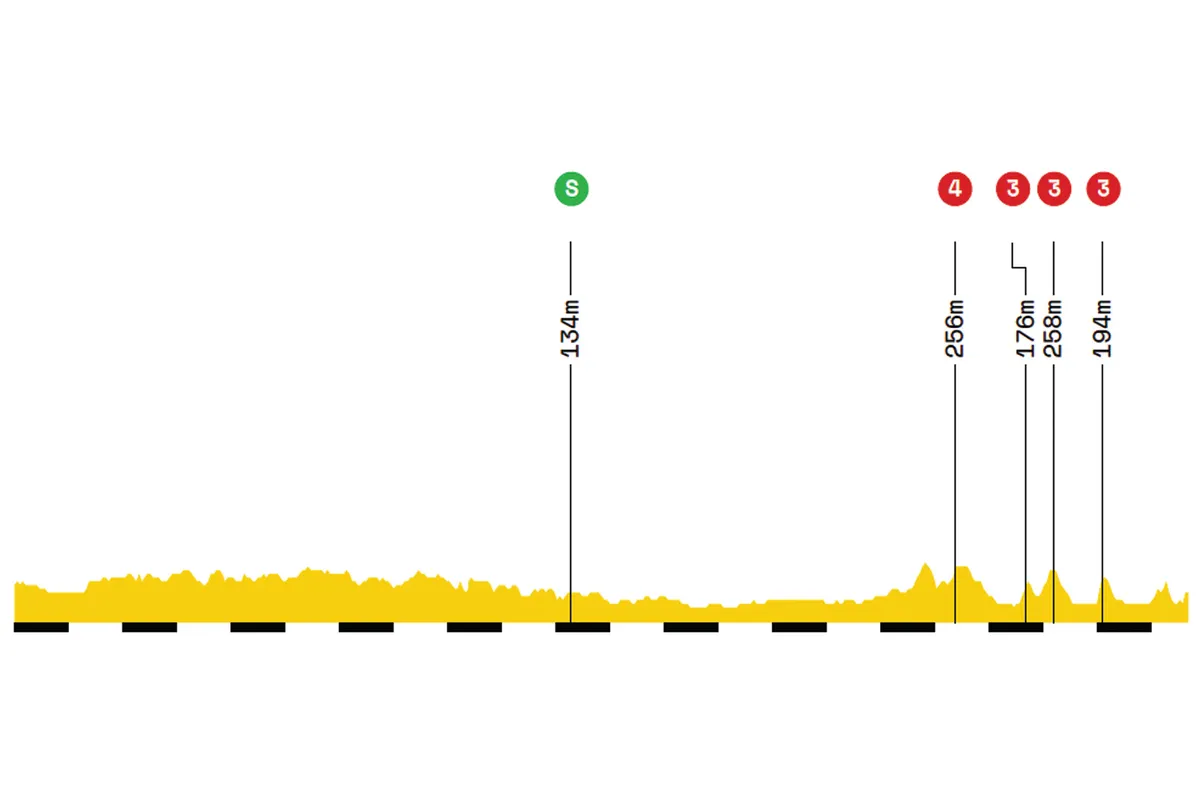
Stage 4: Reims – Nancy
- Date: 9 July
- Distance: 213.5km — Flat
- Did you know? Despite only taking part in three Tours, the legedary Fausto Coppi won twice in Nancy (1949 and 1952)
- The ones to watch: After a poor season by his standards, Peter Sagan (Bora-Hansgrohe) must come good at some point
The race caravan retraces its wheel tracks, heading back north to Reims. Bigger than Épernay in size and contribution to the Champagne trade, Reims has some 200km of cellars in the caves and tunnels, mined for its chalk, 20–40m beneath the surface, which were converted to age the tipple in uniquely cool temperatures.
Only the fans will have time to sample its many grandes marques – Champagne houses – as the peloton hot foots to Nancy.
It’s another excellent opportunity for the sprinters, who need to make hay while the sun shines this year.
All the action today is back loaded into the Nancy finale, with the 3.2km, 5 percent Côte de Maron in the final 15km. It’s a mere speed bump for a Tour peloton, however, and a large bunch will have it all to play for on the flat finish.
Nancy has been a Tour de France staple since the third edition in 1905. Fausto Coppi’s won twice here (1949 and 1952), despite only racing the Tour de France three times.
Another Italian, Matteo Trentin, shone during the most recent visit to the city in 2014, pipping Peter Sagan in a blistering sprint to the line. It was a year of second places for the Slovak who, like Chris Froome winning yellow in 2017 despite not winning a stage, still managed to snaffle a third green jersey.
Stage 4 highlights, times and route profile
- 0km: Depart Reims – 11:25
- 121km: Cat 4 Côte de Rosiéres climb – 14:14
- 147km: Lérouville sprint – 14:50
- 198.5km: Cat 4 Côte de Maron climb – 16:02
- 213.5km: Arrive in Nancy – 16:23
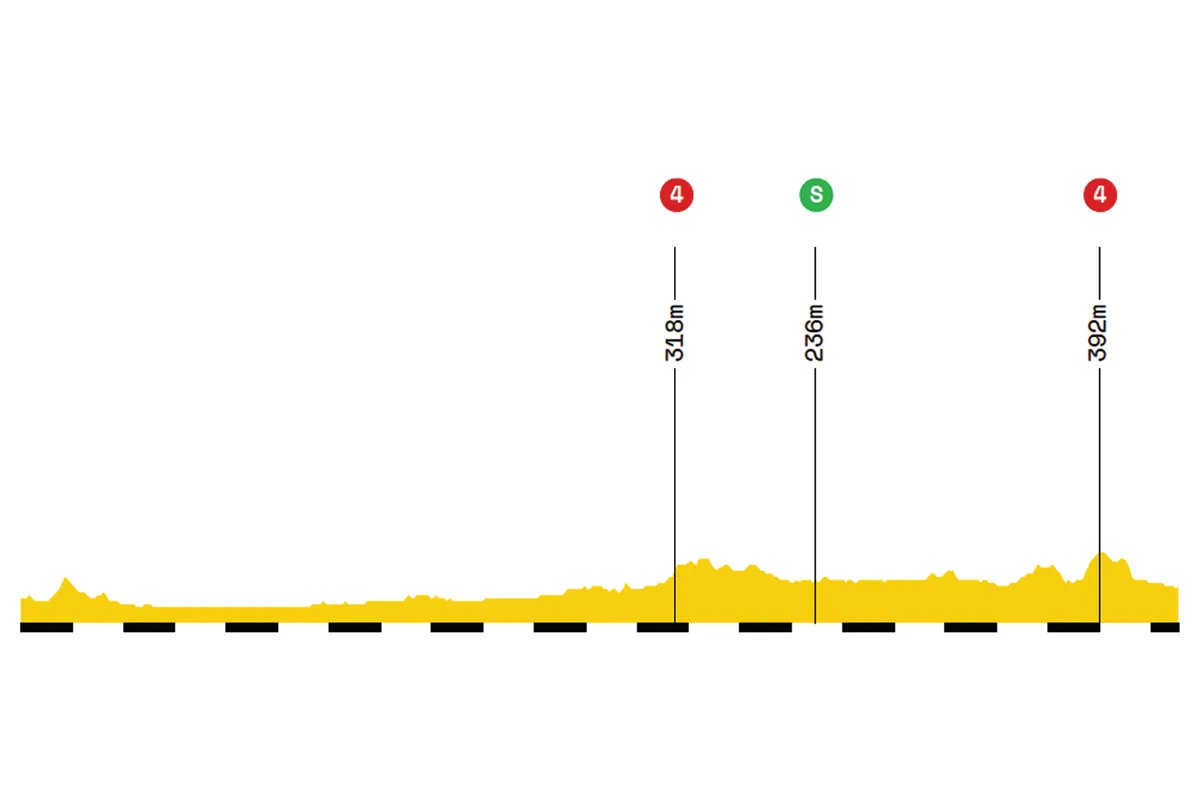
Stage 5: Saint-Dié-des-Vosges – Colmar
- Date: 10 July
- Distance: 175.5km — Hilly
- Did you know? Sheltered by the Vosges, Colmar is the second driest town in France, ideal for Alsace wine production
- The ones to watch: Greg Van Avermaet (CCC Pro Team) is a big man but has enjoyed success on such parcours in the past
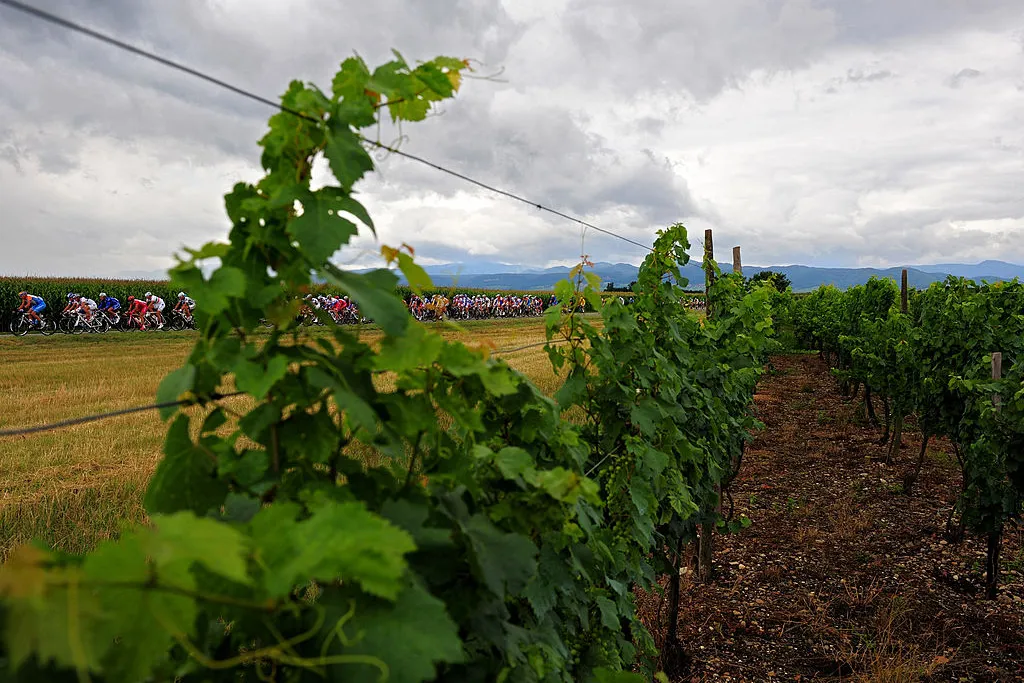
We’re into another major wine region, Alsace, on the edge of the Vosges mountains.
The peloton spends a large chunk of time today on the flatter roads north of the hills ahead of the longer stuff of tomorrow. From the start, locally known as Saint-Dié, it’s not far, as the crow flies, to Colmar – another self-proclaimed wine capital of its region, but adding a huge loop to the north of the Vosges boosts its length.
Heading back south to the finish in Colmar, the route gets complicated, with three 4.6km–5.9km climbs in the second half of the stage, the first significant chance for the climbers to stretch their legs.
It’s nowhere near as tough as the 2009 stage from Vittel to Colmar, where Heinrich Haussler overcame longer Vosges climbs and horrid weather to win by over four minutes.
The summit of the final climb, the 6.1 percent Côte des Cinq Châteaux, arrives just under the 20km to go mark, then there’s a fast descent followed by a long, straight and flat run-in to Colmar.
Perhaps for the first time this year, escape artists will have their eye on the prize today but that finale does them few favours.
Despite tomorrow being a big day for the teams chasing yellow, it’ll still be a twitchy peloton because the Tour always is in the first week, so there’s a chance a big bunch will arrive en-masse.
Stage 5 highlights, times and route profile
- 0km: Depart Saint-Dié-des-Vosges – 12:25
- 44km: Cat 3 Côte de Grendelbruch climb – 13:28
- 71km: Heiligenstein sprint – 14:06
- 109.5km: Cat 2 Côte du Haut-Kenigsbourg climb – 15:01
- 140.5km: Côte des Trois-Épis – 15:45
- 156km: Côte des Cinq Château – 16:08
- 175.5km: Arrive in Colmar – 16:35
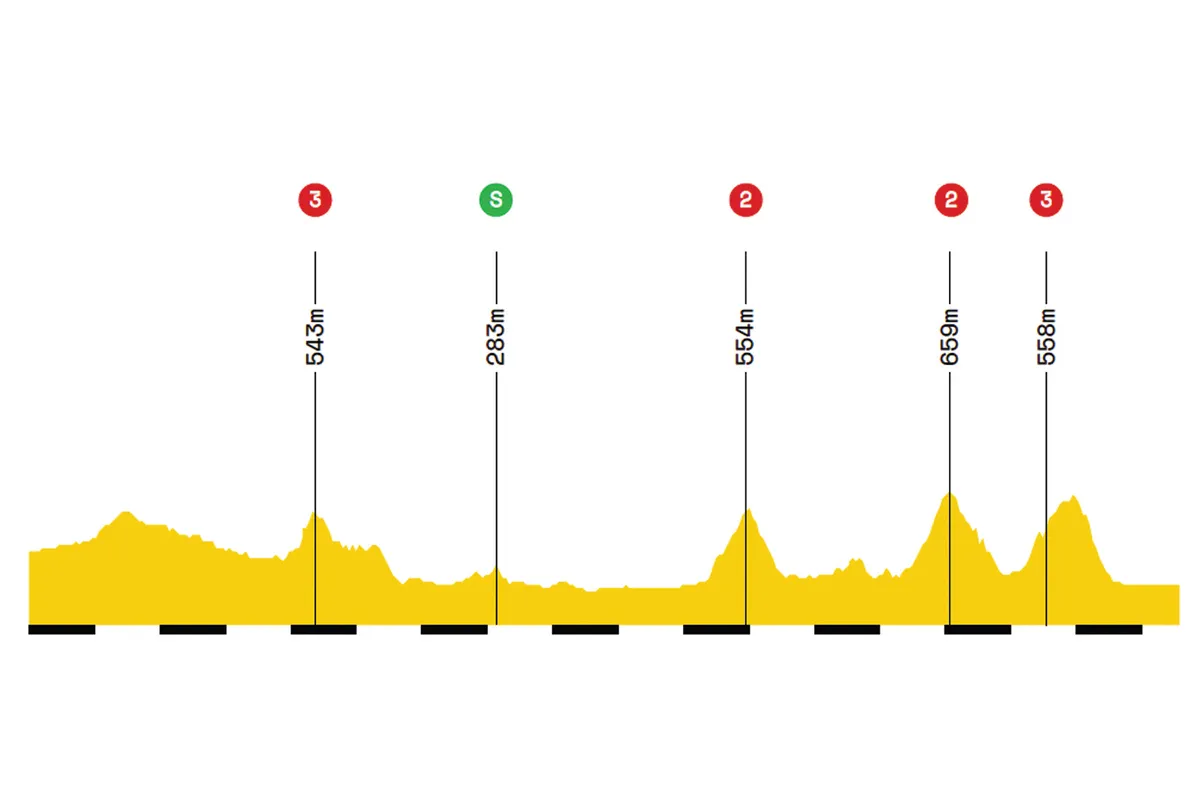
Stage 6: Mulhouse – La Planche des Belles Filles
- Date: 11 July
- Distance: 160.5km — Mountain
- Did you know? It's not the case, but Ballon d'Alsace has gone down in Tour lore as its first mountain pass in 1905
- The ones to watch: Adam Yates (Mitchelton-Scott), using his time with local amateur team CC Etupes, to take his first Tour win
To La Planche des Belles Filles, and the first summit finish of a race that contains five.
The climb is a comparatively recent inclusion to the race, first appearing during Bradley Wiggins’ 2012 triumph, and it’s the climb where Chris Froome won the first of seven career stages.
Whoever ends up in yellow after today’s stage will take solace that on all three previous finishes on this climb, the resultant yellow jersey (Wiggins, Vincenzo Nibali and Froome) has gone onto win the overall in Paris.
A 100 percent conversion is perhaps more than coincidence and speaks to the attritional nature of the modern Tour; while there’s still a hell of a long way to go until Paris, the form a rider shows on the first summit finish augurs well for them.
It’s one of the steeper summit finishes and is tougher this year, bolstered by the addition of a dirt road in the final kilometre that’s 20 percent at the very top.
The Vosges are a low mountain range, but race director Christian Prudhomme is testing riders early in the race, taking them over – via the 1st category climb to Le Markstein ski station – the highest point of the region in the Grand Ballon (1,336m).
Following that there’s also the Ballon d’Alsace (1,178m), a climb used sparingly since WWII, climbed from its eastern side in Sewen.
Stage 6 highlights, times and route profile
- 0km: Depart Mulhouse – 12:25
- 29km: Linthal sprint – 13:07
- 43.5km: Cat 1 Le Markstein climb – 13:40
- 50.5km: Cat 3 Grand Ballon climb – 13:49
- 74km: Cat 2 Col du Hundsruck climb – 14:22
- 105km: Cat 1 Ballon d'Alsace climb – 15:16
- 123.5km: Cat 3 Col des Croix climb – 15:42
- 141.5km: Cat 1 Col des Chevréres climb – 16:09
- 160.5km: Arrive in La Planche des Belles Filles – 16:42
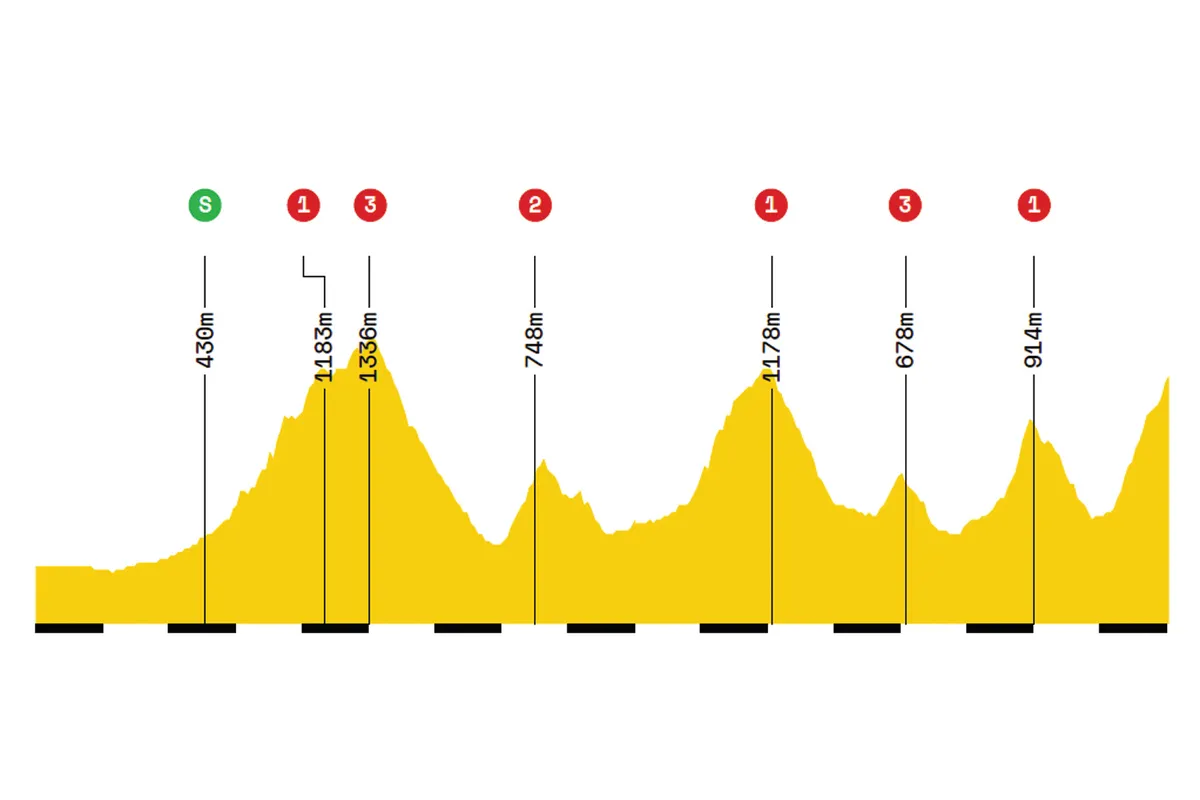
Stage 7: Belfort – Chalon-sur-Saône
- Date: 12 July
- Distance: 230km — Flat
- Did you know? 230km is a long stage in 2019 but the longest ever came in 1919 – 482km from Les Sables-d'Olonned to Bayonne!
- The ones to watch: Any break has little chance of succeeding. The smart money is on fast man, and with Fernando Gaviria (UAE Team Emirates) out of the running it could be a good opportunity for Dylan Groenewegen (Team Jumbo-Visma) to get a win
Today is the sort of post-mountain stage transition day that some fans will question belongs in a 21st century race.
A break will go. It’s got a small chance of staying away. For long stretches, nothing much may seemingly happen.
Such stages, however, remain totally valid in the context of a three-week Grand Tour. At 230km it’s by some distance the longest stage of the race, so with its direct route it eats up plenty of ground in search of more enticing terrain for the approaching weekend.
It also gives the main contenders a much-needed breather, after – and before – more rigorous challenges.
Above all, it’s part of the wearing down process of a Grand Tour, adding nearly six hours on the clock of riders participating in one of the world’s great endurance challenges. The events of today may well catch up with one or two of the main contenders further down the line.
Riders depart early from Belfort on the southern tip of the Vosges, navigating a route that features a lumpy first half and a flat second. The Jura mountains are tantalisingly close in the background but out of contention, with the 4th category Côte de Nans-sous-Sainte-Anne the last of the climbs in this stage before the long, flat run-in to Chalon-sur-Saône.
Stage 7 route profile, highlights and times
- 0km: Depart Belfort – 10:35
- 37.5km: Cat 4 Col de Ferriére climb – 11:28
- 95.5km: Cat 3 Côte de Chassagne-Saint-Denis climb – 12:51
- 119.5km: Cat 4 Côte de Nans-sous-Sainte-Anne climb – 13:26
- 196.5km: Mervans sprint – 15:15
- 230km: Arrive in Chalon-sur-Saône – 16:03
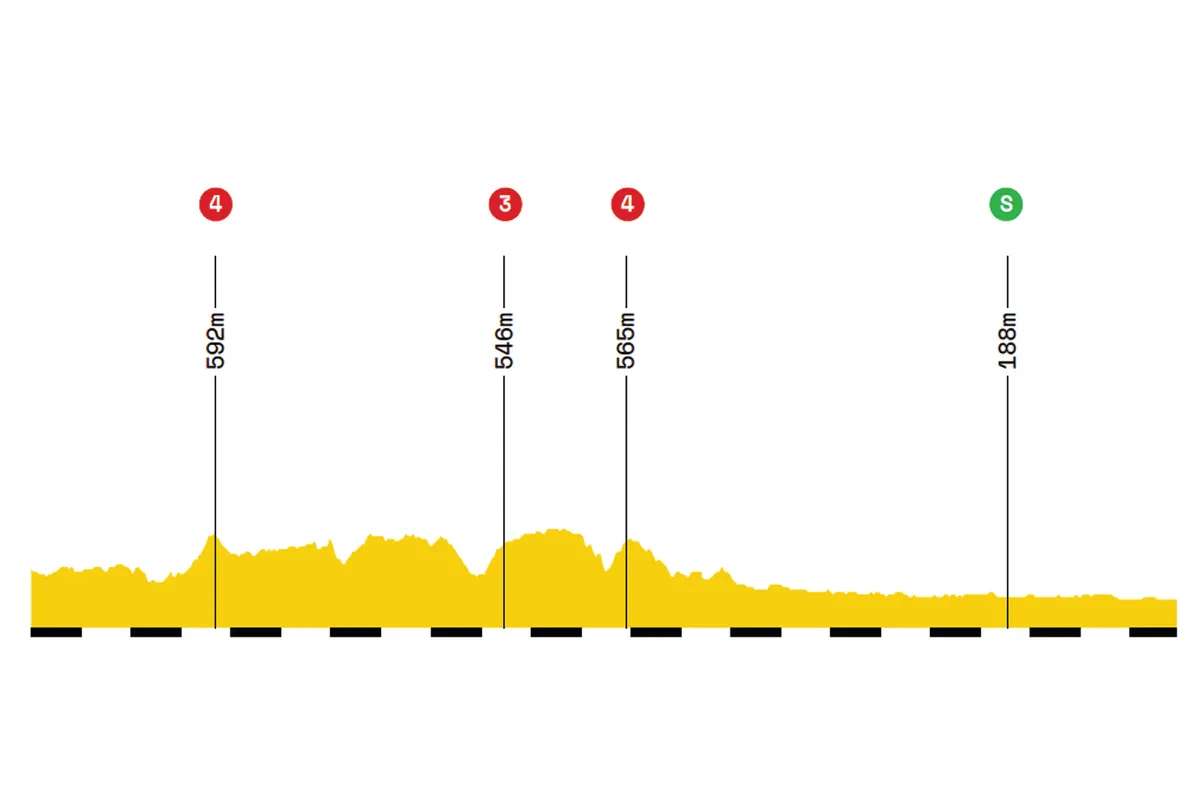
Stage 8: Mâcon – Saint-Étienne
- Date: 13 July
- Distance: 200km — Hilly
- Did you know? Mâcon, in a time trial, is where Lance Armstrong cruised to his fourth (now stripped) Tour — his lead was huge!
- The ones to watch: Alejandro Valverde may be on stage-hunting form this year and he'll like the look of this parcours
The start of the second weekend of the Tour de France can only mean one thing: spectacle.
Sure, there are no showpiece famous cols or summit finishes – that can wait for the final two Saturdays – but the stage’s near 4,000m of vertical is the equal of many mountain stages.
We’re in wine country again, this time Beaujolais, a light red made from the Gamay grape — a young wine that doesn’t keep for many years. Let’s hope the same doesn’t apply to this stage.
Leaving Mâcon and heading south through the small Beaujolais region, the first of five category 2 climbs arrives after 43.5km. Its 7 percent over 6.1km is fairly typical of what the peloton can expect today, and from here the climbs come thick and fast, in a Liège-Bastogne-Liège kind of way.
The route skirts the western edge of Lyon through the Monts du Lyonnais, low altitude mountains in the eastern foothills of the Massif Central, the vast mountain range in southern, central France that spans 15 percent of the country.
The climbs get progressively shorter as we close in on Saint-Étienne, and the finale should be a corker, with a short ramp and descent within the final 4km.
It’s the sort of stage that the general classification contenders have little to gain, but plenty to lose.
Stage 8 highlights, times and route profile
- 0km: Depart Mâcon - 11:25
- 33km: Cercié sprint – 12:13
- 51km: Cat 2 Col de la Croix Montmain climb – 12:45
- 71km: Cat 2 Col de la Croix de Thel climb – 13:16
- 84.5km: Cat 2 Col de la Croix Paquet climb – 13:34
- 133km: Cat 2 Côte de la Croix de Part climb – 14:51
- 148.5km: Cat 2 Côte d'Aveize climb – 15:15
- 187.5km: Cat 3 Côte de la Jaillère climb – 16:10
- 200km: Arrive in Saint-Étienne – 16:27
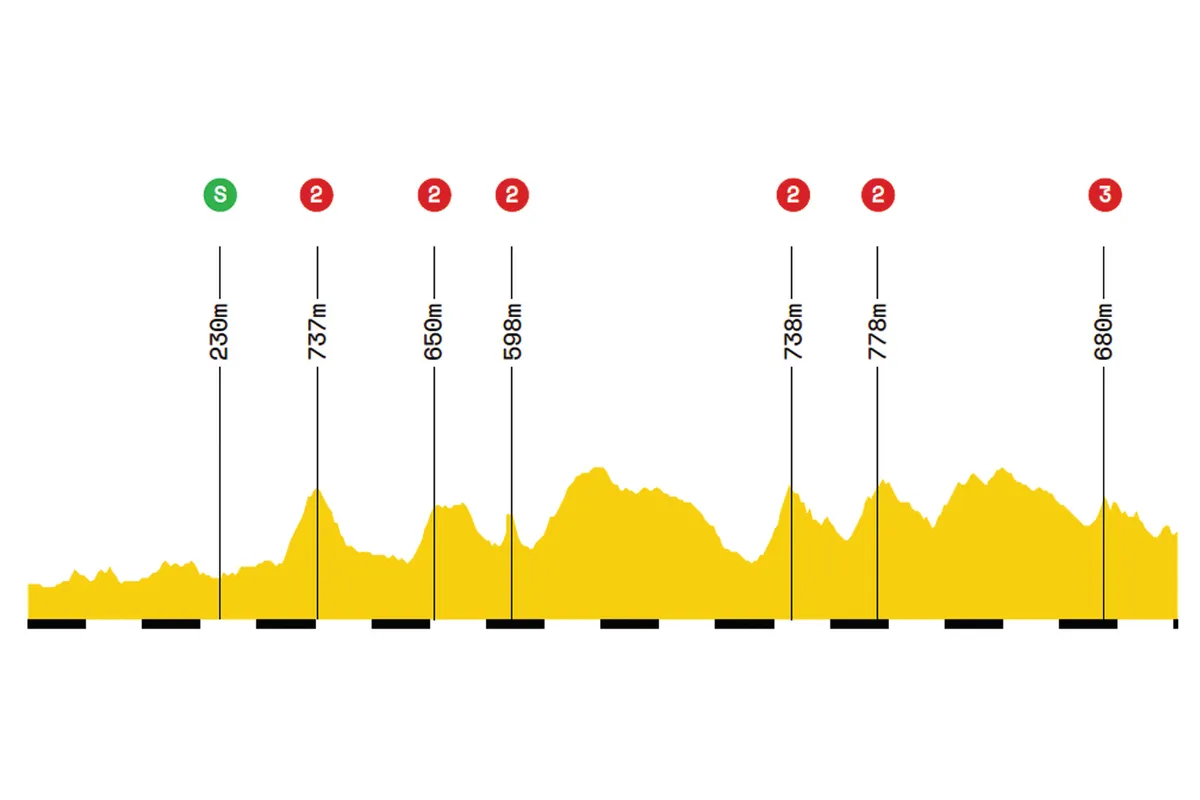
Stage 9: Saint-Étienne – Brioude
- Date: 14 July
- Distance: 170.5km — Hilly
- Did you know? Warren Barguil's win on Bastille Day in 2017 ended a record 12-year wait for a home victory on France's day
- The ones to watch: A Frenchman, maybe David Gaudu (FDJ), to continue the home revival and make it two Bastille Day wins in three.
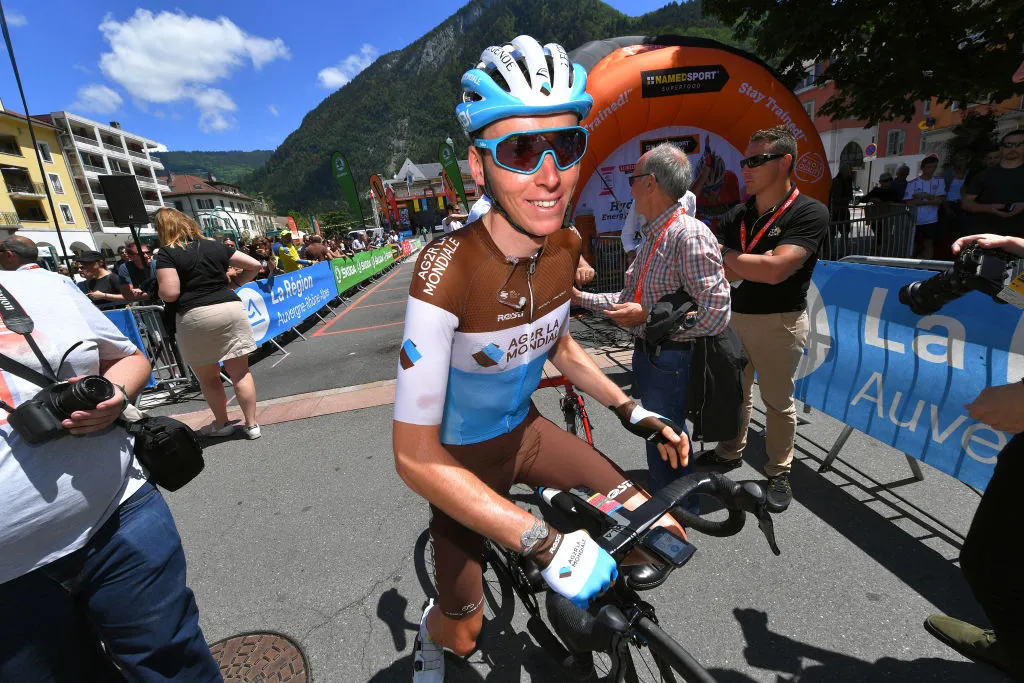
It’s Bastille Day, France’s national holiday. It usually means a day off the clock for French workers, but it’s a Sunday, so most would have had it off anyway.
The Bastille was a medieval prison in Paris that was stormed on this day in 1789 by troops at the beginning of the French Revolution that overthrew the monarchy. Celebrations include military parades in Paris and families getting together around the country.
For the Tour de France, that often means spectators lining the roadside watching a thrilling bike race, featuring prominently – and ideally won by – a Frenchman, and both of those things were true in 2017 when Warren Barguil (now Arkéa–Samsic) won in the Pyrenees to Foix.
Perhaps Romain Bardet (AG2R La Mondiale) will try something – Brioude is his hometown and he recce’d the final kilometres in May, and the downhill into the finish very much favours his skillset as a buccaneering descender.
It will depend on how the race pans out, because the route does favour a breakaway. The route goes higher than the previous stage, breaking 1,000m on the Côte des Guillaumanches, but it’s shorter and not nearly as difficult.
It is, however, the riders who more often than not make the race, and a less daunting parcours may just make for more aggressive racing.
Stage 9 highlights, times and route profile
- 0km: Depart Saint-Étienne – 12:25
- 36.5km: Cat 1 Mur d'Aurec-sur-Loire climb – 13:20
- 92km: Arlanc sprint – 14:39
- 106km: Cat 3 Côte de Guillaumanches climb – 14:59
- 157.5km: Cat 3 Côte de Saint-Just climb – 16:15
- 170.5km: Arrive in Brioude – 16:31
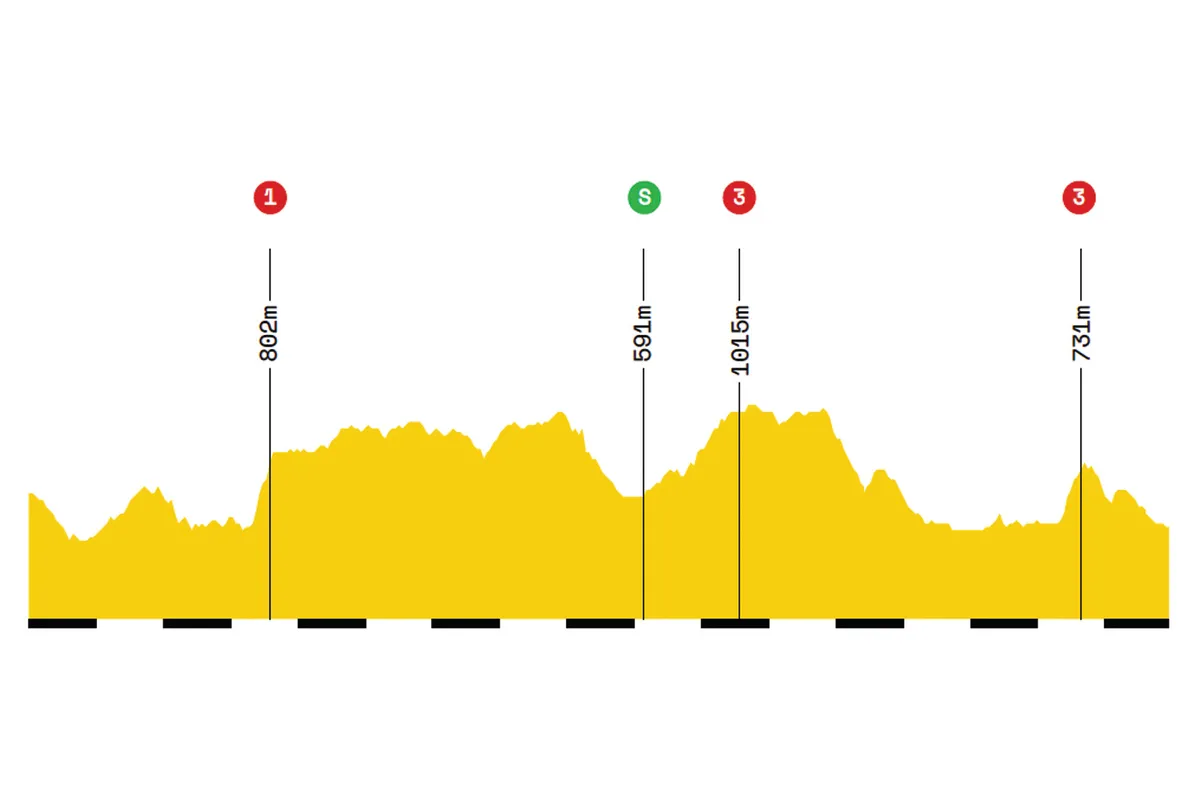
Stage 10: Saint-Flour – Albi
- Date: 15 July
- Distance: 217.5km — Flat
- Did you know: Alexandre Vinokourov won the 2007 time trial in Albi a few days before he – and his team – were booted out
- The ones to watch: Caleb Ewan (Lotto Soudal) for the stage in his debut Tour de France (if he hasn't already won one)
There’s no more stressful a week in cycling than the opening week of the Tour de France and the riders will welcome the downtime of the first rest day in Albi.
It’s not so much about putting their feet up — rides to keep the legs ticking over and media duties for the guys in demand are still required — but the rest day at least allows riders to climb off the race’s stressful merry-go-round.
It’s in an appropriate place, too: Albi was named as the sports capital of France in 2012 by sports daily L’Equipe. Before that, however, there’s still business to be done and this transition stage takes us through the dying embers of the Massif Central and south west, ever closer to the Pyrenees.
The first third of today sees the peloton hovering at around 1,000m altitude, before descending down into the town of Espalion.
The absence of altitude doesn’t ease up the difficulty, however; while this is nominally a ‘flat’ stage in the roadbook, this is ‘French flat’ we’re talking about. A couple of category 3 climbs punctuate a very rolling course and it’s only in the final few kilometres into the finish at Albi where things truly flatten out.
It’s for that reason why the sprinters' teams will be eyeing up today, though you can’t discount a breakaway going the distance.
Stage 10 highlights, times and route profile
- 0km: Depart Saint-Flour – 11:25
- 22km: Cat 4 Côte de Mallet climb – 11:57
- 40.5km: Cat 3 Côte de Chaude-Aigues climb – 12:24
- 95.5km: Cat 3 Côte d'Espalion climb – 13:44
- 128.5km La Primaube sprint – 14:33
- 164.5km: Cat 3 Côte de La Malric climb – 15:25
- 217.5km: Arrive in Albi
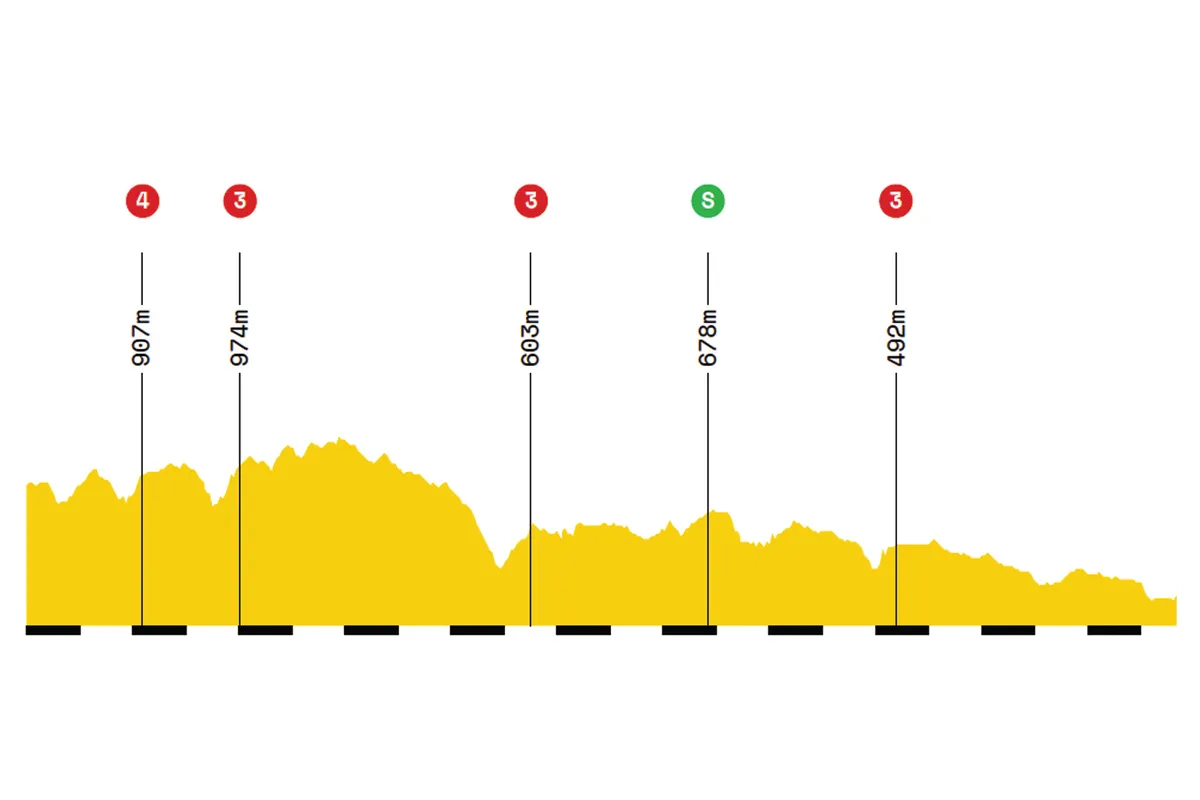
Stage 11: Albi – Toulouse
- Date: 17 July
- Distance: 167km — Flat
- Did you know? Toulouse hosted the finish of the third ever Tour stage in 1903 and was won by Hippolyte Aucouturier
- The ones to watch: Sentimental, rather than smart money, perhaps, but Mark Cavendish to win his 31st Tour de France stage win
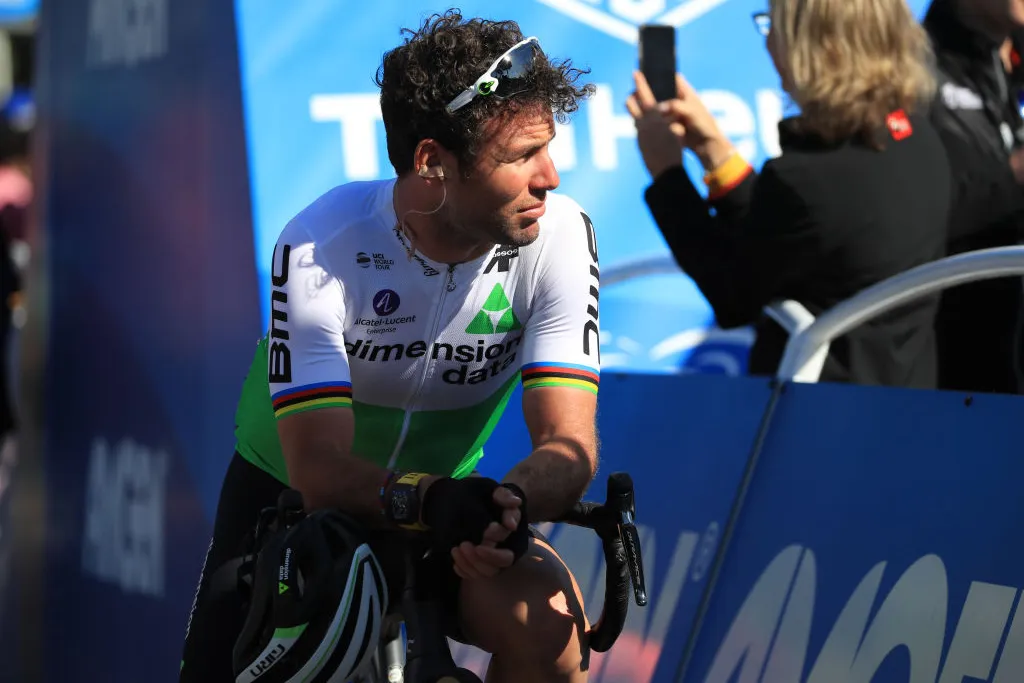
The day after a rest day is notorious for catching GC contenders cold, so they’ll be content indeed looking at the road book today to find a decidedly unthreatening parcours – short and flat! Crosswinds might be their only threat.
It’s surely a day for the sprinters and there’ll be pressure to perform, given this year’s race is so backloaded with mountain stages.
It was around this juncture of the 2018 race when many of the top sprinters in the world were being unceremoniously booted out of the race, with a succession of time cuts missed. Aside from a stage in Nimes, it’s mountains and time trials from here until Paris, so if a sprinter hasn’t notched a win by Toulouse, their number might be up.
Again, it’s rolling terrain, rather than pan-flat, and it’s hard to imagine anything other than a sprint win by Toulouse’s ‘Capitole’ building (its town hall).
While Toulouse, France’s 4th biggest city, is in the top 20 stage hosts of all time (this will be its 26th), it’s not hosted one since 2008, when a young Mark Cavendish won his second Tour de France stage in a race that began north of Albi in Figeac (this came three days after his first win in Châteauroux). Going back a little bit further, Toulouse hosted the finish of stage 3 in 1903, the first ever edition of the Tour.
Stage 11 highlights, times and route profile
- 0km: Depart Albi – 12:45
- 32km: Cat 3 Côte de Tonnac climb – 13:29
- 77km: Cat 4 Côte de Castelnau-de-Montmiral climb – 14:30
- 87km: Gaillac sprint – 14:44
- 167km: Arrive in Toulouse – 16:32
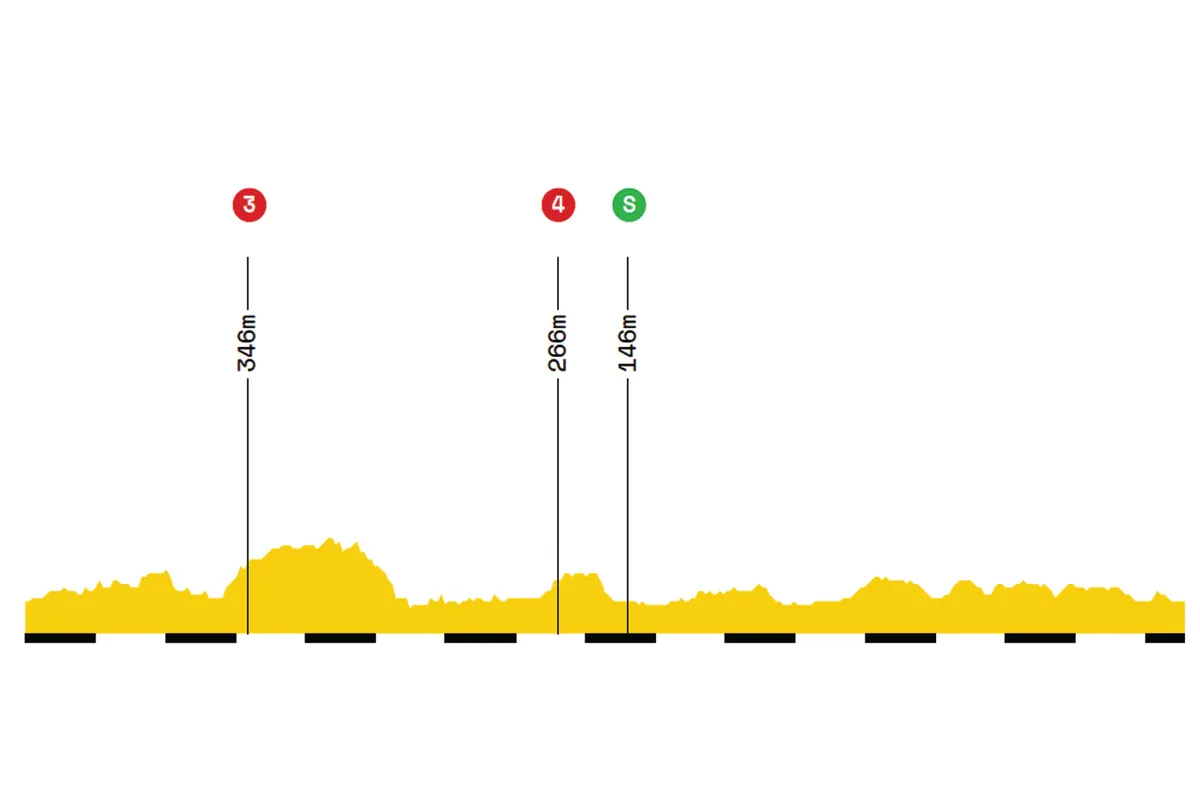
Stage 12: Toulouse – Bagnères-de-Bigorre
- Date: 18 July
- Distance: 209.5km — Mountain
- Did you know? The 1910 race introduced the broom wagon. Back then, if you ended up in it, you could still expect to start the next day
- The ones to watch: Julian Alaphilippe, to showcase his climbing and descending skills and win from a small stage group
The Col de Peyresourde brings up the curtain on the Pyrenees. A perennial Tour climb, it first featured in the 1910 edition – the first time the race went into the Pyrenees and started a truly monstrous 326km stage that also included the Aspin, Tourmalet and Aubisque cols.
It’s a tough stage today, but not quite on that level. From the start in Toulouse, its largely false flat all the way to the sprint in Bagnères-de-Luchon, host of the race on 60 occasions (it’s merely passing through in 2019).
Despite its frequency of use, the Peyresourde is often a priming climb, used at the start of stages that begin in Luchon, and it’s not especially pretty, given it’s a busy road that connects Luchon and Saint-Lary-Soulon.
The same can’t be said for Hourquette d'Ancizan, a recent Tour inclusion (it made its debut in 2011) and a classically Pyrenean climb on a narrow road that has a truly wild feel to it. The climb from the east in Ancizan, which is the route the race takes this year, is tree lined but it opens up beautifully towards the 1,569m summit and continues throughout its peach of a descent.
The stage finishes on the descent into Bagnères-de-Bigorre, bypassing the right turn in Payolle that would, if you were a tourist, take you up another Tour fave, Col d’Aspin.
Stage 12 highlights, times and route profile
- 0km: Depart Toulouse – 10:50
- 62.5km: Cat 4 Côte de Montoulieu-Saint-Bernard climb – 12:19
- 130.5km: Bagnères-de-Luchon sprint – 13:56
- 146km: Cat 1 Col de Peyresourde climb – 14:32
- 179km: Cat 1 Hourquette d'Ancizan climb - 15:29
- 209.5km: Arrive in Bagnères-de-Bigorre – 16:09
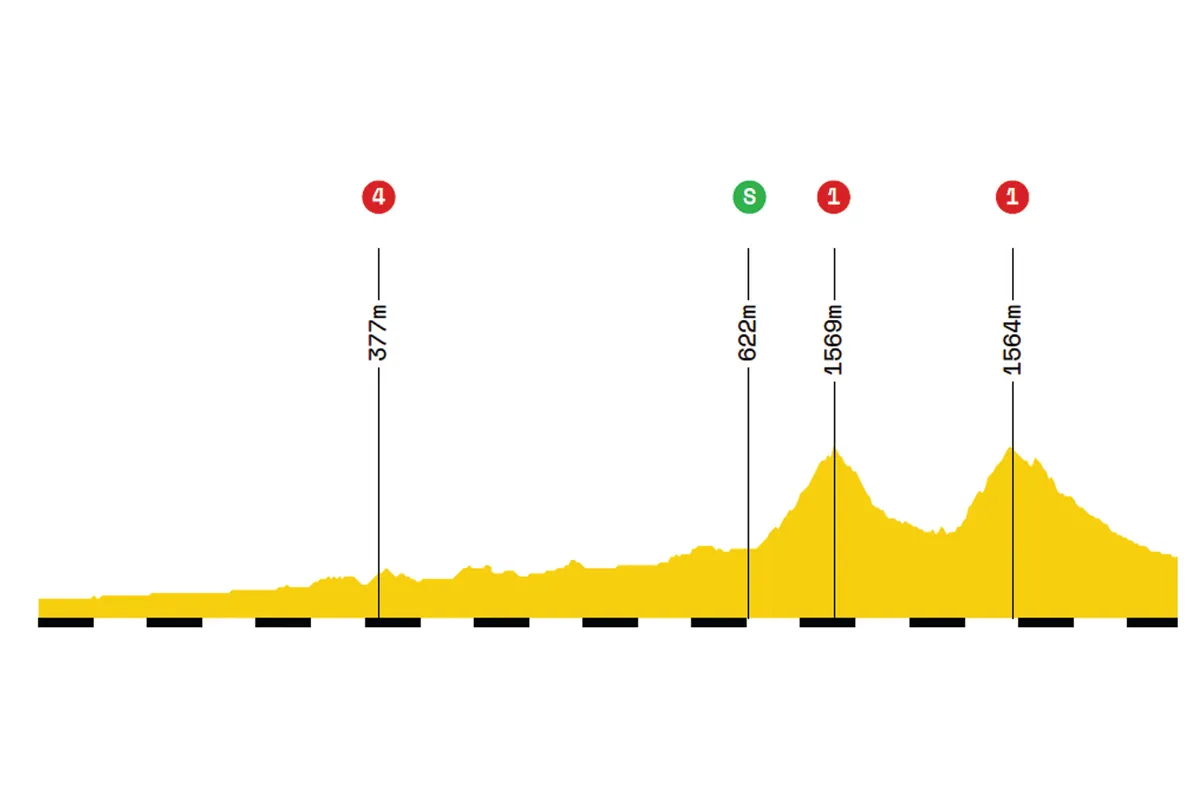
Stage 13: Pau – Pau
- Date: 19 July
- Distance: 27.2km — Individual time-trial
- Did you know? This year's La Course women's race takes place today on the same course as the time trial (five laps over 120km).
- The ones to watch: Rohan Dennis, the time trial World Champion, to win the stage.
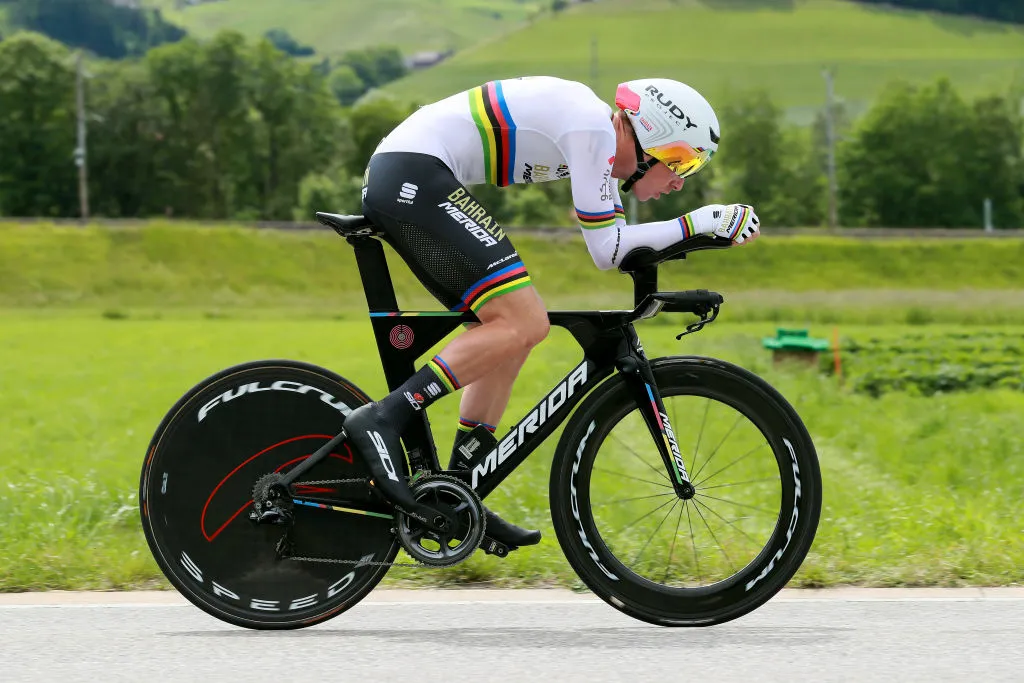
There have never been as few solo time trial kilometres as there have been in recent Tours de France (2015’s 14km being the all-time low).
The reason is simple: in an age of often attritional racing in the mountains, where a cigarette paper can separate the leaders, a long time trial has too significant a bearing on the overall result of a race that the majority of people are tuning into for the road stages.
The answer is a trend for shorter time trials, on hillier courses.
How much this is done to favour home favourite Romain Bardet, a rider who often ships large amounts of time in races against the clock, and how much is to benefit the race as a whole, we don’t know, but we do know that the French would dearly love a homegrown winner.
After all, it’s been 34 long years – Chris Froome was two months old! - since it last happened (Bernard Hinault in 1985).
The course, which heads south of the city in a loop, is rolling from the start, reaching a max elevation of 372m in Medout at 11.8km (Pau is at 182m), before flattening out in the final third.
The time gaps come the close of play won’t be huge, but in the context of the modern Tour significant enough, and Christian Prudhomme will be hoping it leaves things delicately poised, with a generous helping of mountains still to come for the climbing specialists.
Stage 13 highlights, times and route profile
- 0km: Depart Pau Le Tour des Géants – 13:00 to 16:19
- 7.7km: Split 1 Cériset – 13:10 to 16:29
- 15.5km: Split 2 Côte d'Esquillot – 13:20 to 16:39
- 21.9m: Split 3 Jurancon – 13:28 to 16:47
- 27.2km: Arrive in Pau – 13:35 to 16:54
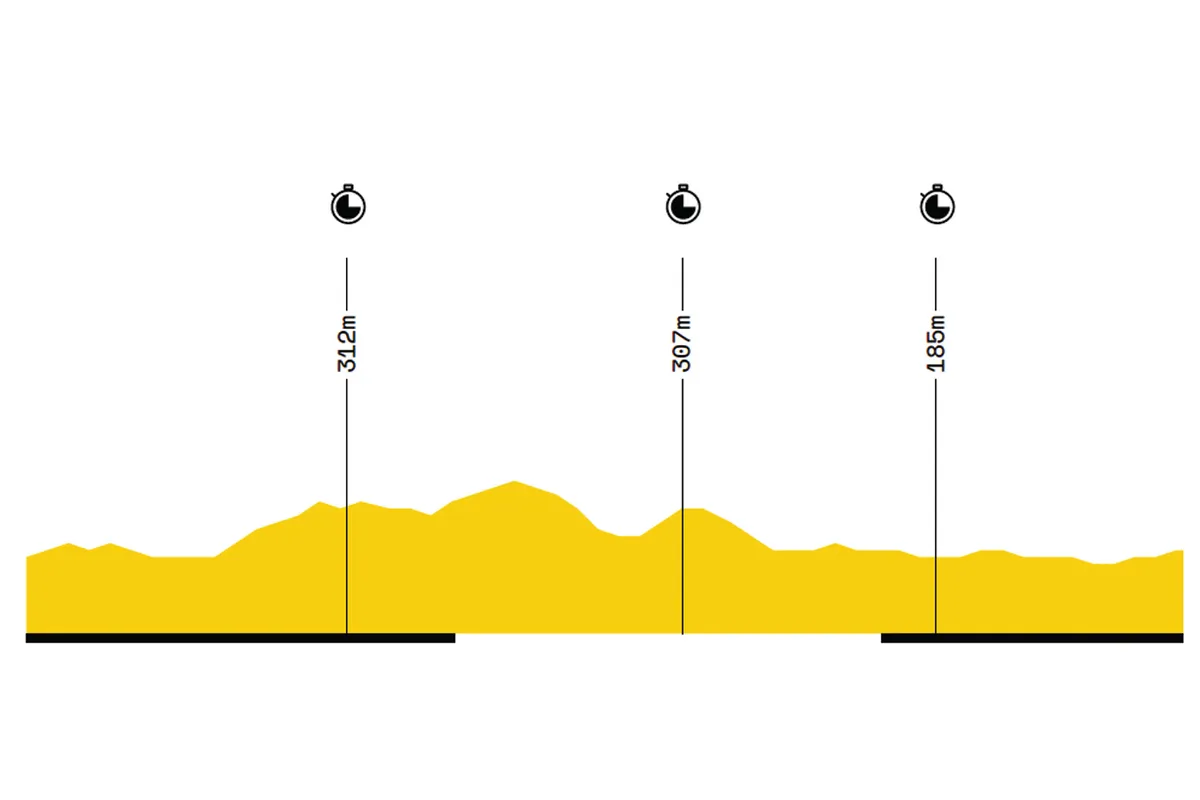
Stage 14: Tarbes – Tourmalet
- Date: 20 July
- Distance: 117.5km — Mountain
- Did you know? 100 years of the yellow jersey will be celebrated on the Tourmalet, the race's most historic mountain
- The ones to watch: A Romain Bardet win would delight the home fans and be an appropriate way to celebrate the journey
After the (failed) experiment of the ultra-short 65km Pyrenean stage last year, Christian Prudhomme has reverted back to what used to constitute a short mountain stage with this finish on the Tourmalet.
The 65km stage failed because it was too hard. Today has two, rather than three cols, and while it finishes on the massive 19km, 7.4 percent Tourmalet, the peloton might not be so cowed by it.
After being primed on the category 1 Col du Soulor, the race climbs the Tourmalet from the western Luz-Saint-Sauveur side; it’s the equal in terms of average gradient (7.4 percent) as the La Mongie side from the east, but it’s the lesser of the two in terms of satisfaction (this western side is preceded by a huge stretch of false flat in the valley from Argeles- Gazost).
This will be the 81st time the Tourmalet has featured in the race – more than any other climb – but it’s just the third summit finish (the lack of infrastructure at the top makes it problematic).
The last time they finished here, in 2010, Alberto Contador and Andy Schleck shadow-boxed their way to the summit, as Schleck attempted — and failed — to shake the stubborn Spaniard off his wheel. Schleck would win the stage (or rather gifted from Contador) with his opponent content with his overall lead.
Stage 14 highlights, times and route profile
- 0km: Depart Tarbes – 12:45
- 18km: Cat 4 Côte du Labatmale climb – 13:10
- 60.5km: Cat 1 Col du Soulor climb - 14:24
- 86km: Pierrefitte-Nestalas sprint – 14:55
- 117.5km: Arrive in Tourmalet – 16:02
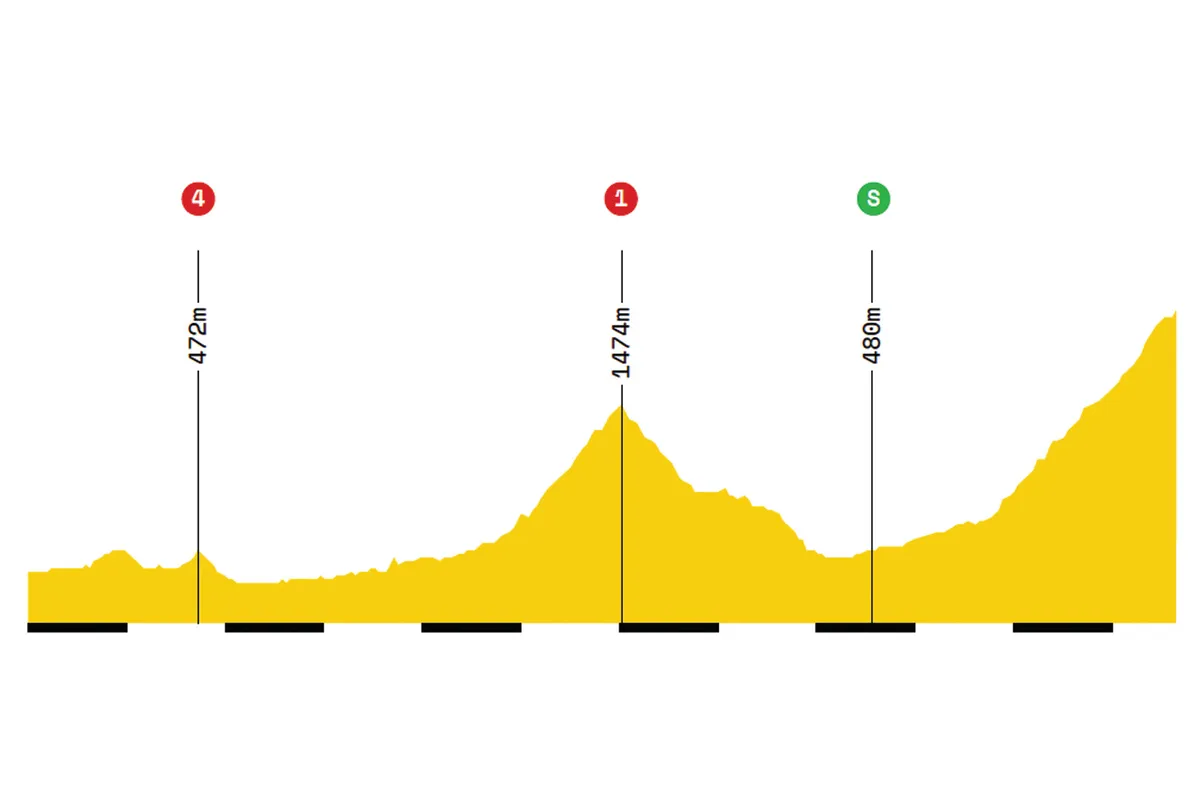
Stage 15: Limoux – Foix Prat d'Albis
- Date: 21 July
- Distance: 185km — Mountain
- Did you know? Prat d'Albis has never been climbed by the race, continuing a search for new, untested climbs to showcase
- The ones to watch: Dan Martin (Team UAE Emirates) loves the Pyrenees. This is a final climb he can get his teeth stuck into
Hot on the heels of the novelty of a Tourmalet finish comes a totally new climb, on Prat d’Albis, for what is, with close to 5,000m of climbing, the toughest stage of this year’s Pyrenees sojourn.
On any other day the soothing sound of cowbells would greet a cyclist at the summit of the second climb, the 11.4km Port de Lers – today the noise will be drowned out by the Tour de France circus. Soon after, the 9.3km Mur de Péguère gets steep – and narrow – towards its summit, with its final 3.5km between 11 and 13 percent.
It was just a couple of years ago that the Tour last came to the Péguère, as Warren ‘Wawa’ Barguil sealed his place in the affections of the French public by out-sprinting Nairo Quintana, Mikel Landa and Alberto Contador on Bastille Day in Foix.
Today, however, the peloton aren’t nearly done once they reach Foix; instead they must winch themselves up Prat d’Albis, a narrow, Vueltaesque dead-end road to seemingly nowhere, 800 metres further above the Ariège town.
Team Ineos, including Geraint Thomas and Wout Poels, recce’d the new climb in May, which is said to have terrific, far-reaching views on a good day. With a rest day tomorrow, and a 300km transfer to Nîmes, it’s time for the riders to leave everything on the road.
Stage 15 highlights, times and route profile
- 0km: Depart Limoux – 11:10
- 60.5km: Cat 2 Col de Montségur climb – 12:47
- 93.5km: Tarascon-sur-Ariége sprint – 13:35
- 120.5km: Cat 1 Port de Lers climb – 14:29
- 147km: Cat 1 Mur de Péguére climb – 15:18
- 185.5km: Arrive in Foix Prat d'Albis – 16:23
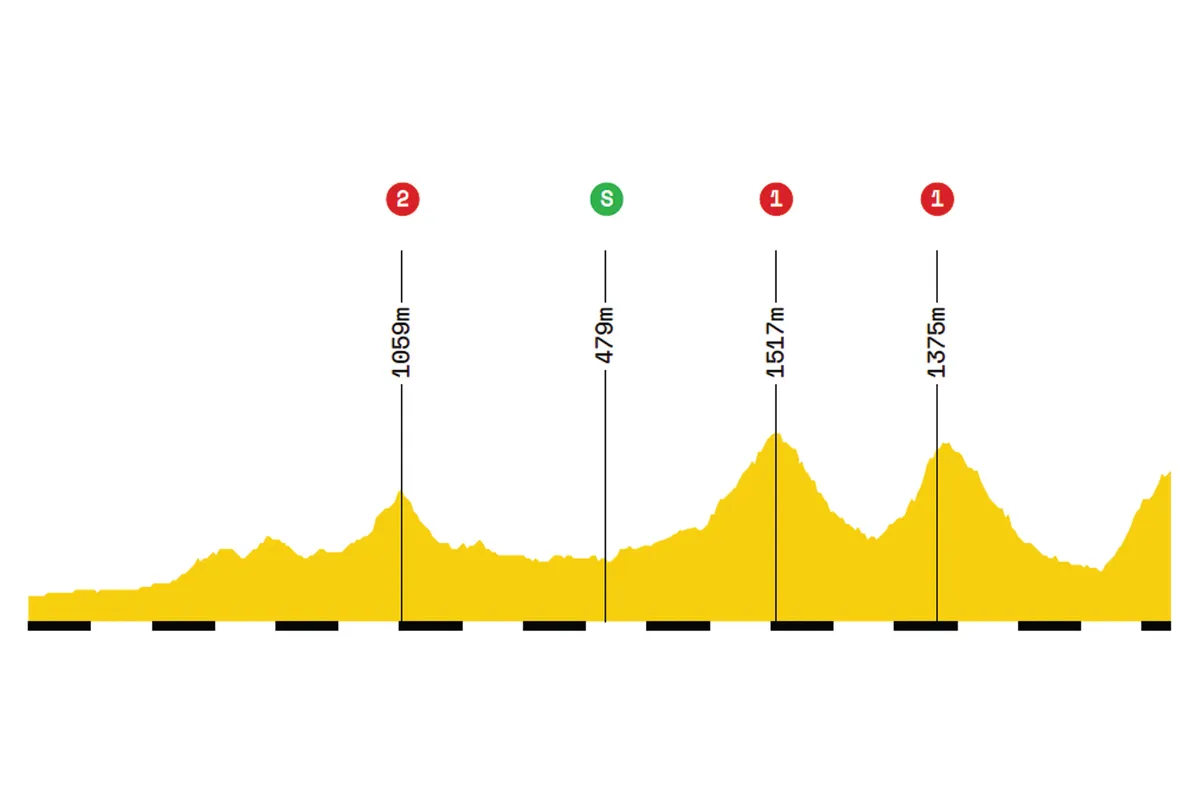
Stage 16: Nîmes – Nîmes
- Date: 23 July
- Distance: 177km — Flat
- Did you know: Nîmes is another happy hunting ground of Mark Cavendish, and the site of his fourth stage win in 2008
- The ones to watch: Dylan Groenewegen (Team Jumbo-Visma) to take another win before a torried Alpine mountain grind
It’s rather unusual for Tour de France host towns to get a start and finish of a road stage on the same day and it’s likely got something to do with the deal negotiated when Nîmes hosted the start of the Vuelta a España in 2017 (such deals often come as part of a package).
Yet the city’s association with the Tour goes back well over a century, hosting its first start and finish in 1905, the third edition.
Nîmes is a city of 150,000 people, sandwiched inland between the larger coastal cities of Montpellier and Marseille. It’s heralded as the ‘Rome of France’ , the ‘most Roman’ city outside of Italy and it’s easy to see why with its marvellous amphitheatre, the Arena of Nîmes.
The clockwise loop today sticks within the boundaries of the Gard department and serves as something of a solitary respite between an almost exclusive barrage of mountains that have passed in the Pyrenees and remain in the Alps.
It’s the final chance for the sprinters, or what remains of them if they haven’t succumbed to the brutal time cuts, before Paris, but again, it’s one of those ‘French flat’ stages, more rolling than pan flat.
There’s a short, sharp climb around 17km from the finish, but it shouldn't pose an issue for even the most flat track of bullies.
Stage 16 highlights, times and route profile
- 0km: Depart Nîmes – 12:30
- 65km: Vallérargues sprint – 13:56
- 96km: Cat 4 Côte de Saint-Jean-du-Pin climb – 14:38
- 177km: Arrive in Nîmes – 16:26
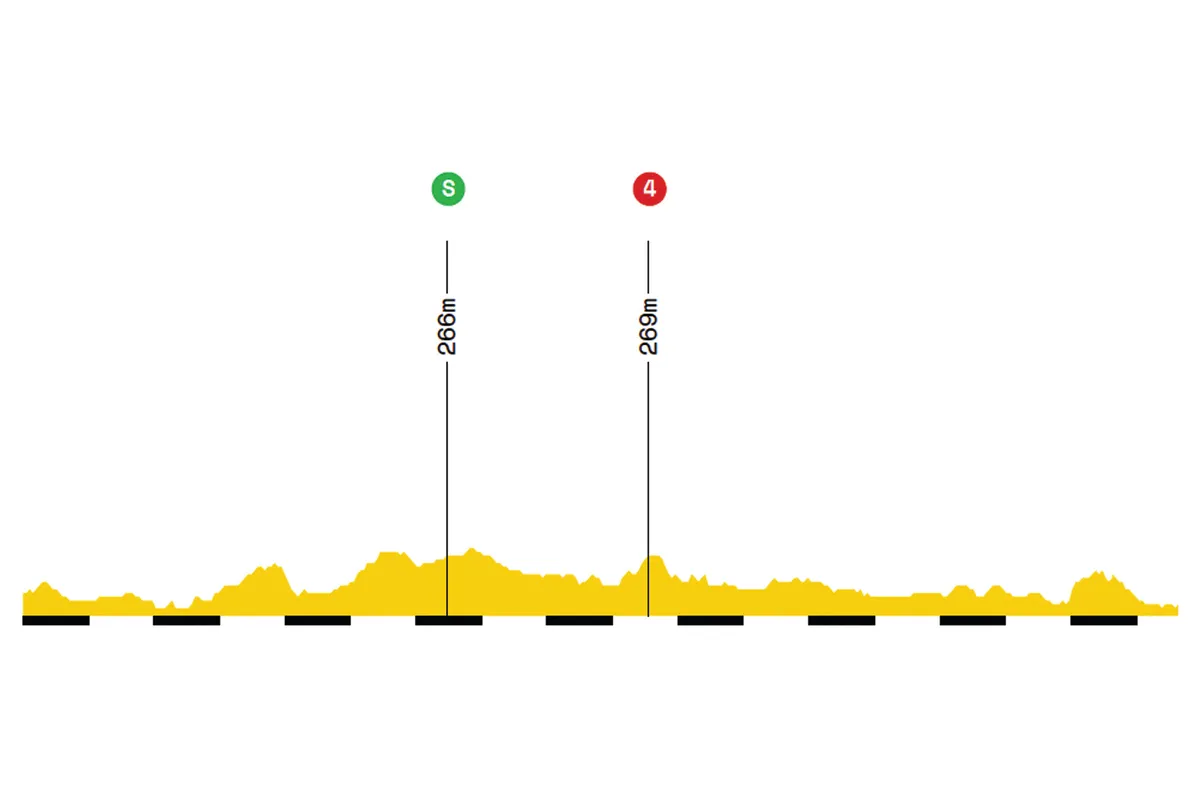
Stage 17: Pont du Gard – Gap
- Date: 24 July
- Distance: 200km — Hilly
- Did you know? French fave jean-François Bernard won his first stage in 1986 by over three minutes in a stage from Nîmes to Gap
- The ones to watch: Simon Clarke (EF Education First) is enjoying his best season and might be let off the leash
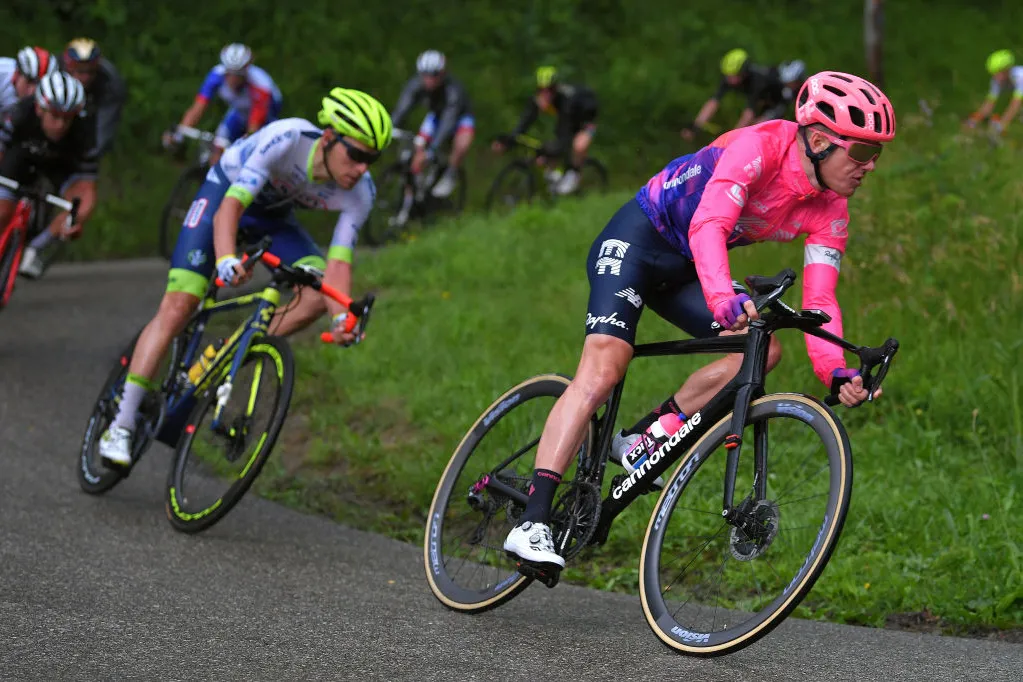
Today has solo move written all over it, as the peloton finally heads into the Alps ahead of three successive gruelling stages.
We begin at the Pont du Gard, a magnificent first century structure — France’s most-visited ancient monument — that was once the highest (48m) aqueduct of the Roman world, built to supply water to nearby Nîmes, then a hub of the empire.
It served as an aqueduct until the 6th century before becoming a tollgate in the Middle Ages and a road bridge from the 18th to 20th century. Now it’s been restored to its former glory, free of tyranny of motor vehicles.
As for the stage, the peloton climbs gradually over 70km to reach a height of 883m just after the half way point at the summit of the Col de Mévouillon. The course then plateaus somewhat for another 75km before the final challenge of the Col de la Sentinelle, a 5.2km 5.4 percent climb topping out 8.5km before the finish, with a descent into Gap punctuated by a couple of small rises.
The town often favours long-distance attacks, from Jean-François Bernard in 1986 to most recently, in 2015, Rubén Plaza, and with three huge stages on the trot starting tomorrow, the leaders will be happy to let unthreatening riders go to the finish.
Stage 17 highlights, times and route profile
- 0km: Depart Pont du Gard – 11:40
- 62km: Vaison-la-Romaine sprint – 13:09
- 104.5km: Cat 4 Côte de la Rochette-du-Buis climb – 14:09
- 191.5km: Cat 3 Col de la Sentinelle climb – 16:13
- 200km: Arrive in Gap – 16:25
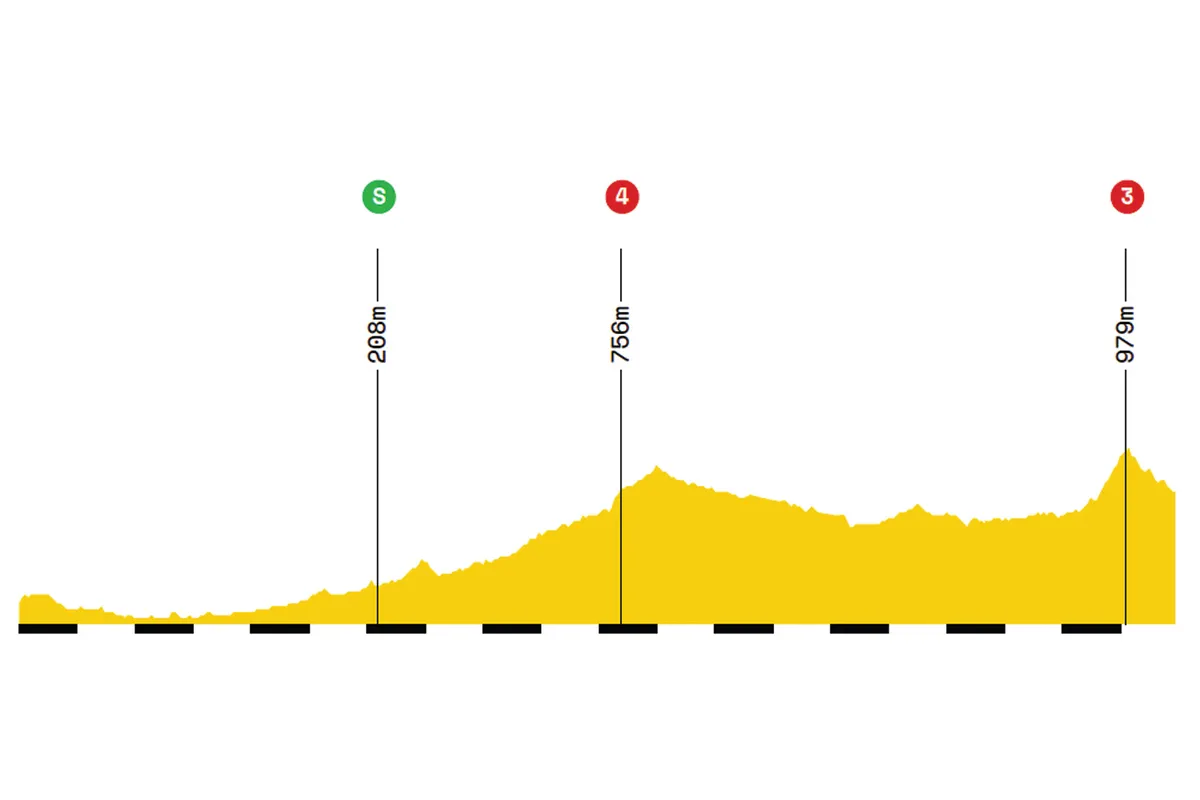
Stage 18: Embrun – Valloire
- Date: 25 July
- Distance: 208km — Mountain
- Did you know? The Galibier, so often the highest Tour climb, is 128m lower than the Co d'Iseran of tomorrow's stage
- The ones to watch: Nairo Quintana (Movistar), a native of high altitude in Colombia, often thrives on the long, towering climbs
When Christian Prudhomme declared at the race’s launch last October that this was the ‘highest Tour in history’, this is one of the stages that backs that claim up. We still think 1998’s race, that of the Festina drugs scandal, was the highest, but it depends on your definition of high.
Tomorrow’s stage actually sees the race go higher, over Europe’s highest pass (Col d’Iseran), but today has something unusual for the Tour – three increasingly higher climbs over the 2,000m mark.
First comes the tougher side of the Col de Vars from Saint-Paul-sur-Ubaye (9.3km at 7.5 percent), moving swiftly onto the Col d’Izoard, home to some of the most dramatic scenes in the Alps – and the scene of so much dramatic racing.
On its last visit in 2017, it hosted its first-ever summit finish (Warren Barguil winning to complete his remarkable Tour), but today the race continues, following a familiar route down to Briançon, France’s highest city.
From there it’s a long, steady drag up the wide roads of the Col du Lauteret (2,058m), before a right-turn onto the early slopes of the imposing Galibier (2,642m).
Many of the main contenders would be grateful for a summit finish. Instead, the best descenders will seize upon the long 19km descent.
Stage 18 highlights, times and route profile
- 0km: Depart Embrun – 10:25
- 13km: Côte des Damoiselles Coiffées cat. 3 climb – 10:47
- 45km: Les Thuiles sprint – 11:34
- 82.5km: Cat 1 Col de Vars climb – 12:45
- 133km: HC Col d'Izoard – 14:12
- 189km: HC Col du Galibier – 15:56
- 208km: Arrive in Valloire – 16:17
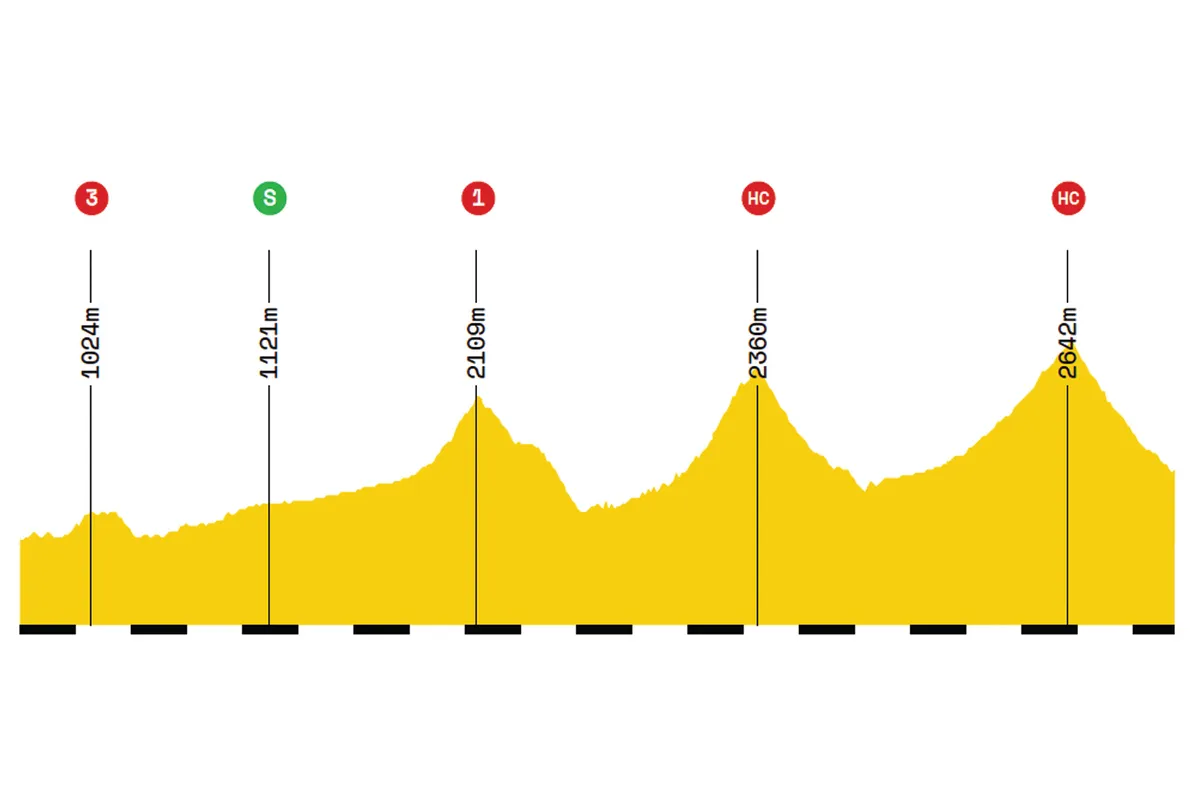
Stage 19: Saint-Jean-de-Maurienne – Tignes
- Date: 26 July
- Distance: 126.5km — Mountain
- Did you know? The first to the summit of the race (Col d'Iseran) wins the Souvenir Henri Desgrange – and €5,000 to boot!
- The ones to watch: Colombian Egan Bernal (Team Ineos) often fares well at high altitude
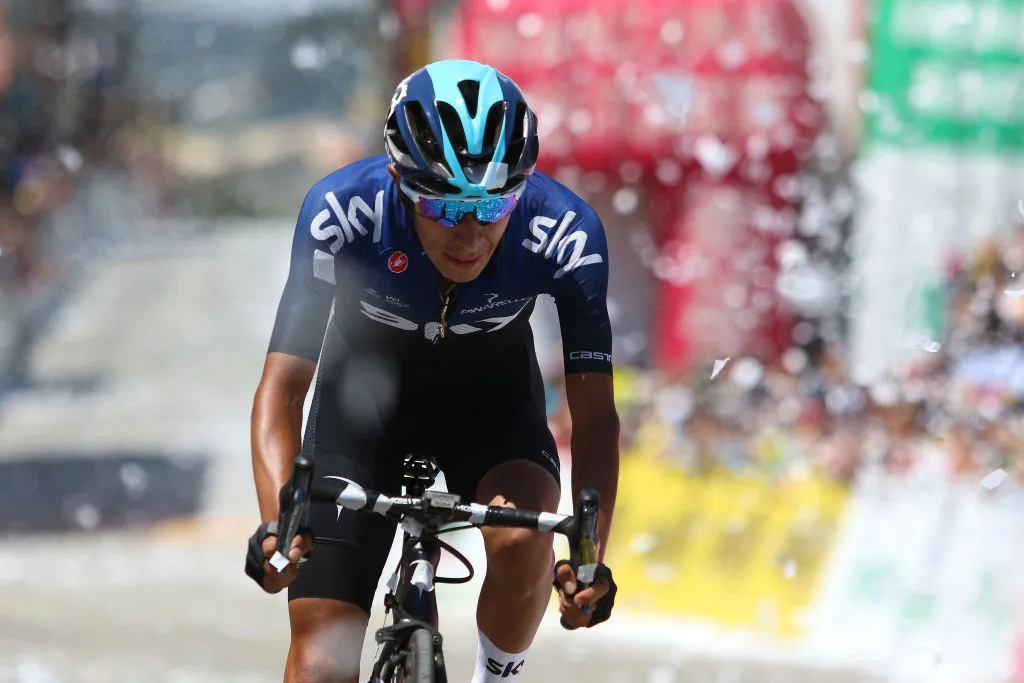
Today has the feel of a ramp test with near incessant climbing in one form or another, from the start in Saint- Jean-de-Maurienne (585m), all the way up to the summit of the Col d’Iseran (2,770m) – the highest mountain pass in Europe – 89km into the stage.
There’s nothing particular sinister about the 7.5 percent average gradient of the 12.9km Iseran, besides the toughest kilometre (10.2) being its penultimate.
Rather, it’s the towering altitude this late in the race that will be of most concern to the GC contenders. The Colombians tend to fare best, given their altitudinal heritage.
Despite its status as Europe’s highest pass, it’s infrequently employed – this is only its third appearance since 1963, and just the second time ever it’ll climb the south side from Bonneval-sur-Arc.
From the summit, there’s a 15km descent into the popular ski resort of Val d’Isere, then a further drop before a final ascent through the various towns of neighbouring Tignes, finishing at 2,113m – the fifth time in two days that the race has broken 2,000m.
The contenders for yellow will have to manage their resources wisely ahead of tomorrow.
Stage 19 route profile, highlights and times
- 0km: Depart Saint-Jean-de-Maurienne – 12:55
- 25km: Cat 3 Côte de Saint-André climb – 13:35
- 38km: Cat 2 Montée d'Aussois climb – 14:01
- 63.5km: Cat 3 Col de la Madeleine climb – 14:40
- 68.5km: Bessans sprint – 14:48
- 89km: HC Col de l'Iseran – 15:36
- 124.5km: Cat 1 Montée de Tignesclimb – 16:32
- 165.5km: Arrive in Tignes – 16:35
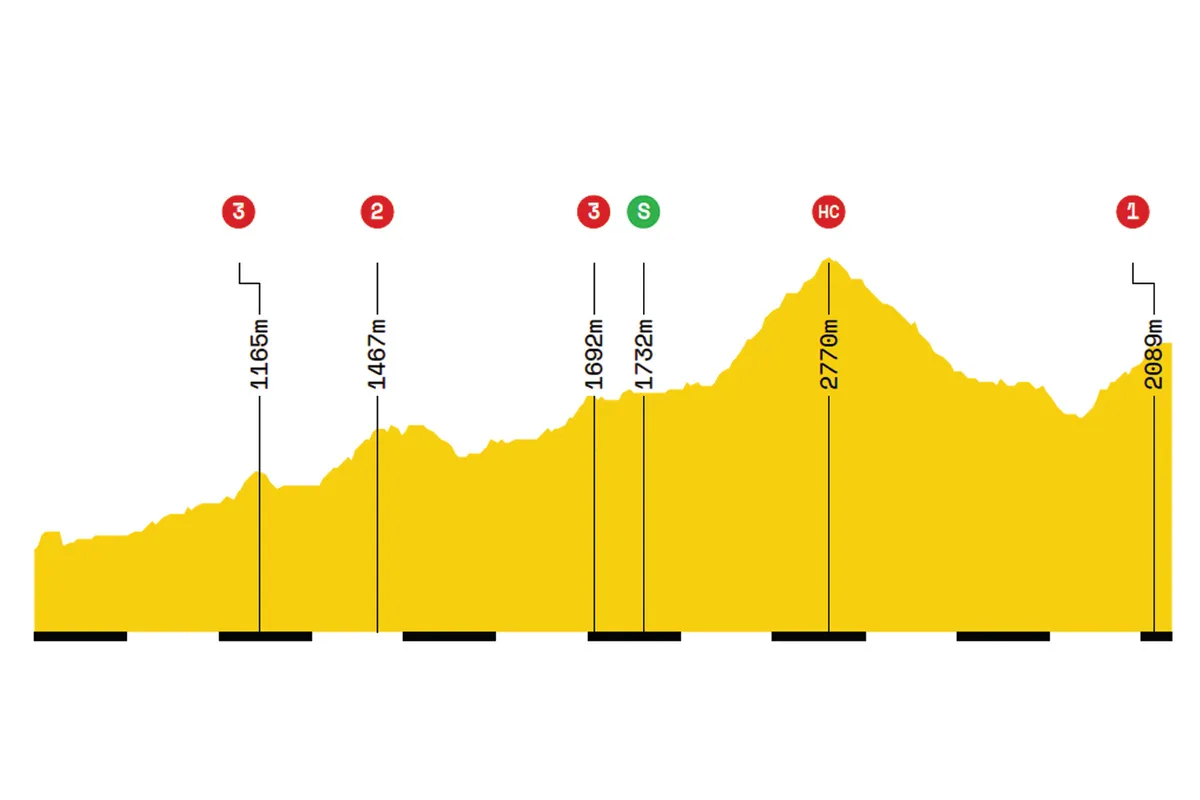
Stage 20: Albertville – Val Thorens
- Date: 27 July
- Distance: 130km — Mountain
- Did you know? The road to Val Thorens will be the seventh time the race has passed above 2,000m altitude this year
- The ones to watch: The yellow jersey on the defensive, a minor contender to take the spoils – perhaps someone like Rigoberto Urán
This is it. The final chance for the yellow jersey to hold their nerve, for his challengers to deliver a telling blow, for the also rans to salvage their race and for the remaining sprinters to simply survive one more day of toil before Paris. Everyone still in the race has something to play for.
What a way for mountain stages to bow out too. After the lovely Cormet de Roselend comes new kid on the block, the Côte de Longefoy (6.6km at 6.5 percent).
The meat in today’s sandwich, however, is the mammoth climb up to the Val Thorens ski resort, the fifth and final summit finish of the 2019 Tour de France. From Moutiers at 539m, Val Thorens sits at 2,365m (once again, we’re over 2000m) and when you take into account the four sections of descent you’re looking at, all done, 2,000m of elevation gain.
It’s a climb, like the similarly interminable Col de la Croix de Fer, where the average gradient of 5.5 percent over its 33.4km doesn’t begin to do it justice. While it only briefly gets into double digit gradients, strip out the descents and you’re staring at a sturdy 7 percent.
Riders of the 2019 Etape du Tour will have ridden this route six days earlier, the majority in twice the time as the predicted four hours of today’s winner, putting their efforts into some perspective.
Stage 20 highlights, times and route profile
- 0km: Depart Albertville – 12:45
- 11.5km: Villard-sur-Doron sprint – 13:03
- 36km: Cat 1 Cormet de Roselend climb – 13:57
- 75.5km: Cat 2 Côte de Longefoy climb – 14:55
- 130km: Arrive in Val Thorens – 16:44
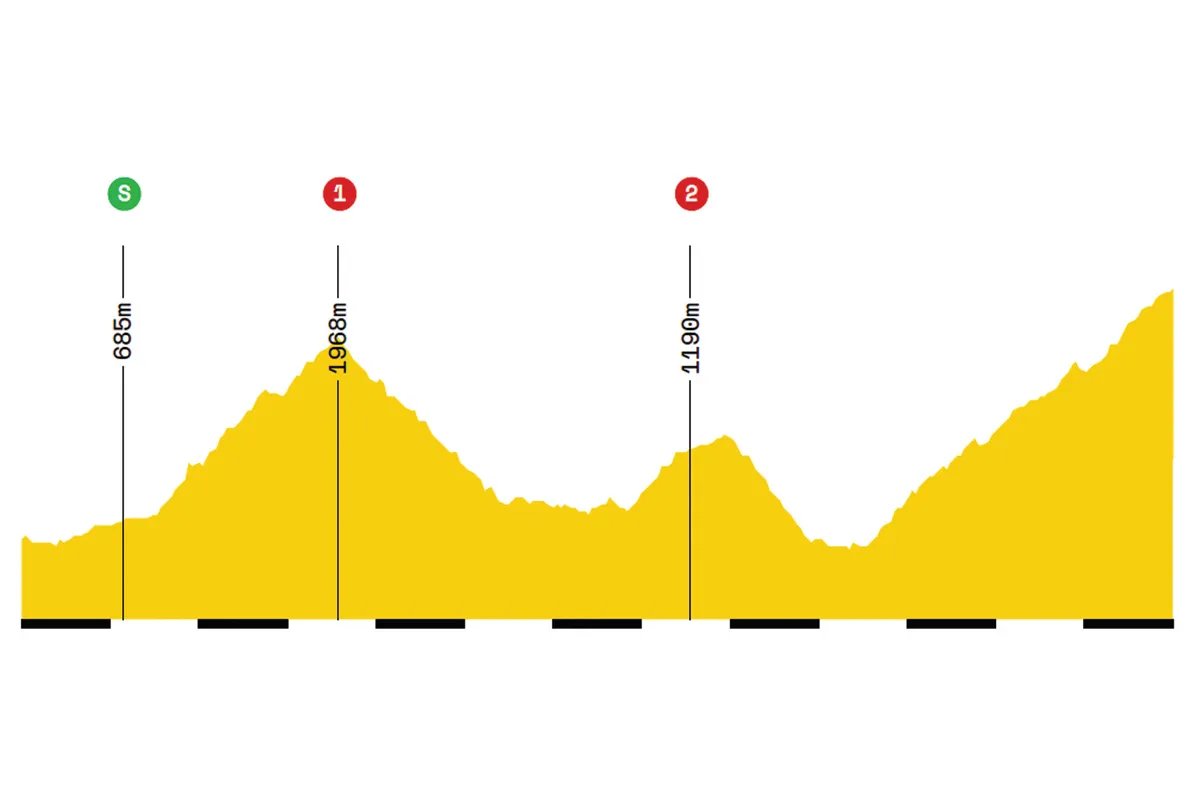
Stage 21: Rambouillet — Paris Champs-Élysées
- Date: 28 July
- Distance: 128km — Flat
- Did you know? Greg LeMond won the best Tour finish in 1989. He beat Laurent Fignon in the 24.5km time trial to leapfrog him
- The ones to watch: Alexander Kristoff (UAE Team Emirates) won last year here and has the engine to overcome the mountains
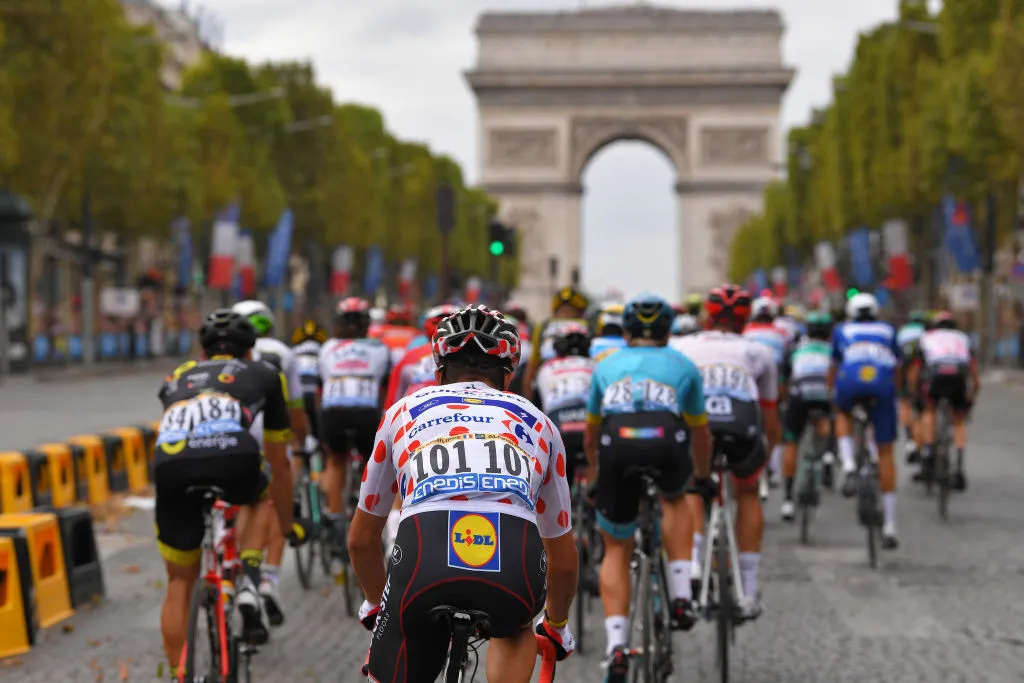
One of these days, Christian Prudhomme, the race director, ought to keep the racing going through the final stage.
This Paris procession, where the yellow jersey isn’t attacked at any point in the stage, is a long-held tradition, but it turns what should be a showpiece occasion into a bit of a damp squib. Is that too harsh a view? Perhaps.
There is spectacle in the final sprint on the Champs-Élysées – a bucket list victory for all the top sprinters – and the recently introduced evening finish has added atmosphere into the final, but for many the race has already finished the day before.
The yellow jersey has already had their ‘winner’s’ press conference, allowing an early bath for many of the media (to be fair, they deserve it after three weeks of overlong days and unwashed clothes).
For those who do make it, the sprint is one of the best of the year, with the teams winding it up over eight laps of the Champs-Élysées. Surviving this far is an achievement for the pure sprinters and there was a time when they’d be voluntarily on the beach by now, such was their reluctance to suffer through the mountains.
But they get judged on results – and this is one their team managers and sponsors will have had marked for them since the start of the season.
Stage 21 highlights, times and route profile
- 0km: Depart Rambouillet – 17:10
- 34km: Cat 4 Côte de Saint-Rémy-lés-Chevreuse climb – 18:12
- 38km: Cat 4 Côte de Châteaufort climb – 18:18
- 89.5km: Paris – Haut de Champs-Élysées sprint – 19:36
- 128km: Arrive in Paris, Champs-Élysées – 20:19
